#different levels of understanding between people is realistic
Text
Horses: Since There Seems To Be A Knowledge Gap
I'm going to go ahead and preface this with: I comment pretty regularly on clips and photos featuring horses and horseback riding, often answering questions or providing explanations for how or why certain things are done. I was a stable hand and barrel racer growing up, and during my 11 year tenure on tumblr, Professional Horse Commentary is a very niche, yet very necessary, subject that needs filling. Here are some of the literary and creative gaps I've noticed in well meaning (and very good!) creators trying to portray horses and riding realistically that... well, most of you don't seem to even be aware of, because you wouldn't know unless you worked with horses directly!
Some Of The Most Common Horse + Riding Mistakes I See:
-Anybody can ride any horse if you hold on tight enough/have ridden once before.
Nope. No, no, no, no, aaaaaaaand, no. Horseback riding has, historically, been treated as a life skill taught from surprisingly young ages. It wasn't unusual in the pre-vehicular eras to start teaching children as young as 4 to begin to ride, because horses don't come with airbags, and every horse is different. For most adults, it can take months or years of regular lessons to learn to ride well in the saddle, and that's just riding; not working or practicing a sport.
Furthermore, horses often reject riders they don't know. Unless a horse has been trained like a teaching horse, which is taught to tolerate riders of all skill and experience levels, it will take extreme issue with having some random person try to climb on their back. Royalty, nobility, and the knighted classes are commonly associated with the "having a favorite special horse" trope, because it's true! Just like you can have a particularly special bond with a pet or service animal that verges on parental, the same can apply with horses. Happy horses love their owners/riders, and will straight-up do their best to murder anyone that tries to ride them without permission.
-Horses are stupid/have no personality.
There isn't a more dangerous assumption to make than assuming a horse is stupid. Every horse has a unique personality, with traits that can be consistent between breeds (again, like cat and dog breeds often have distinct behavior traits associated with them), but those traits manifest differently from animal to animal.
My mother had an Arabian horse, Zipper, that hated being kicked as a signal to gallop. One day, her mom and stepdad had a particularly unpleasant visitor; an older gentleman that insisted on riding Zipper, but refused to listen to my mother's warnings never to kick him. "Kicking" constitutes hitting the horse's side(s) with your heels, whether you have spurs on or not. Most horses only need a gentle squeeze to know what you want them to do.
Anyway, Zipper made eye-contact with my mom, asking for permission. He understood what she meant when she nodded at him. He proceeded to give this asshole of a rider road rash on the side of the paddock fence and sent him to the emergency room. He wouldn't have done it if he didn't have the permission from the rider he respected, and was intelligent enough to ask, "mind if I teach this guy a lesson?" with his eyes, and understand, "Go for it, buddy," from my mom in return.
-Riding bareback is possible to do if you hold onto the horse's mane really tight.
Riding a horse bareback (with no saddle, stirrups, or traditional harness around the horse's head) is unbelievably difficult to learn, particularly have testicles and value keeping them. Even professional riders and equestrians find ourselves relying on tack (the stuff you put on a horse to ride it) to stay stable on our horses, even if we've been riding that particular horse for years and have a very positive, trusting relationship.
Horses sweat like people do. The more they run, the more their hair saturates with sweat and makes staying seated on them slippery. Hell, an overworked horse can sweat so heavily that the saddle slips off its back. It's also essential to brush and bathe a horse before it's ridden in order to keep it healthier, so their hair is often quite slick from either being very clean or very damp. In order to ride like that, you have to develop the ability to synchronize your entire body's rhythm's with the rhythm of the horse's body beneath you, and quite literally move as one. Without stirrups, most people can't do it, and some people can never master bareback riding no matter how many years they spend trying to learn.
-You can be distracted and make casual conversation while a horse is standing untethered in the middle of a barn or field.
At every barn I've ever worked at, it's been standard practice with every single horse, regardless of age or temperament, to secure their heads while they're being tacked up or tacked down. The secures for doing this are simple ropes with clips that are designed to attach to the horse's halter (the headwear for a horse that isn't being ridden; they have no bit that goes in the horse's mouth, and no reins for a rider to hold) on metal O rings on either side of the horse's head. This is not distressing to the horse, because we give them plenty of slack to turn their heads and look around comfortably.
The problem with trying to tack up an unrestrained horse while chatting with fellow stable hands or riders is that horses know when you're distracted! And they often try to get away with stuff when they know you're not looking! In a barn, a horse often knows where the food is stored, and will often try to tiptoe off to sneak into the feed room.
Horses that get into the feed room are often at a high risk of dying. While extremely intelligent, they don't have the ability to throw up, and they don't have the ability to tell that their stomach is full and should stop eating. Allowing a horse into a feed/grain room WILL allow it to eat itself to death.
Other common woes stable hands and riders deal with when trying to handle a horse with an unrestrained head is getting bitten! Horses express affection between members of their own herd, and those they consider friends and family, through nibbling and surprisingly rough biting. It's not called "horseplay" for nothing, because during my years working with horses out in the pasture, it wasn't uncommon at all for me to find individuals with bloody bite marks on their withers (that high part on the middle of the back of their shoulders most people instinctively reach for when they try to get up), and on their backsides. I've been love-bitten by horses before, and while flattering, they hurt like hell on fleshy human skin.
So, for the safety of the horse, and everybody else, always make a show of somehow controlling the animal's head when hands-on and on the ground with them.
-Big Horse = War Horse
Startlingly, the opposite is usually the case! Draft and carriage horses, like Percherons and Friesians, were never meant to be used in warfare. Draft horses are usually bred to be extremely even-tempered, hard to spook, and trustworthy around small children and animals. Historically, they're the tractors of the farm if you could afford to upgrade from oxen, and were never built to be fast or agile in a battlefield situation.
More importantly, just because a horse is imposing and huge doesn't make it a good candidate for carrying heavy weights. A real thing that I had to be part of enforcing when I worked at a teaching ranch was a weight limit. Yeah, it felt shitty to tell people they couldn't ride because we didn't have any horses strong enough to carry them due to their weight, but it's a matter of the animal's safety. A big/tall/chonky horse is more likely to be built to pull heavy loads, but not carry them flat on their spines. Horses' muscular power is predominantly in their ability to run and pull things, and too heavy a rider can literally break a horse's spine and force us to euthanize it.
Some of the best war horses out there are from the "hot blood" family. Hot blooded horses are often from dry, hot, arid climates, are very small and slight (such as Arabian horses), and are notoriously fickle and flighty. They're also a lot more likely to paw/bite/kick when spooked, and have even sometimes been historically trained to fight alongside their rider if their rider is dismounted in combat; kicking and rearing to keep other soldiers at a distance.
-Any horse can be ridden if it likes you enough.
Just like it can take a lifetime to learn to ride easily, it can take a lifetime of training for a horse to comfortably take to being ridden or taking part in a job, like pulling a carriage. Much like service animals, horses are typically trained from extremely young ages to be reared into the job that's given to them, and an adult horse with no experience carrying a rider is going to be just as scared as a rider who's never actually ridden a horse.
Just as well, the process of tacking up a horse isn't always the most comfortable experience for the horse. To keep the saddle centered on the horse's back when moving at rough or fast paces, it's essential to tighten the belly strap (cinch) of the saddle as tightly as possible around the horse's belly. For the horse, it's like wearing a tight corset, chafes, and even leaves indents in their skin afterward that they love having rinsed with water and scratched. Some horses will learn to inflate their bellies while you're tightening the cinch so you can't get it as tight as it needs to be, and then exhale when they think you're done tightening it.
When you're working with a horse wearing a bridle, especially one with a bit, it can be a shocking sensory experience to a horse that's never used a bit before. While they lack a set of teeth naturally, so the bit doesn't actually hurt them, imagine having a metal rod shoved in your mouth horizontally! Unless you understand why it's important for the person you care about not dying, you'd be pretty pissed about having to keep it in there!
-Horseback riding isn't exercise.
If you're not using every muscle in your body to ride with, you're not doing it right.
Riding requires every ounce of muscle control you have in your entire body - although this doesn't mean it wasn't realistic for people with fat bodies to stay their weight while also being avid riders; it doesn't mean the muscles aren't there. To stay on the horse, you need to learn how it feels when it moves at different gaits (walk, trot, canter, gallop), how to instruct it to switch leads (dominant legs; essential for precise turning and ease of communication between you and the horse), and not falling off. While good riders look like they're barely moving at all, that's only because they're good riders. They know how to move so seamlessly with the horse, feeling their movements like their own, that they can compensate with their legs and waists to not bounce out of the saddle altogether or slide off to one side. I guarantee if you ride a horse longer than 30 minutes for the first time, your legs alone will barely work and feel like rubber.
-Horses aren't affectionate.
Horses are extraordinarily affectionate toward the right people. As prey animals, they're usually wary of people they don't know, or have only recently met. They also - again, like service animals - have a "work mode" and a "casual mode" depending upon what they're doing at the time. Horses will give kisses like puppies, wiggle their upper lips on your hair/arms to groom you, lean into neck-hugs, and even cuddle in their pasture or stall if it's time to nap and you join them by leaning against their sides. If they see you coming up from afar and are excited to see you, they'll whinny and squeal while galloping to meet you at the gate. They'll deliberately swat you with their tails to tease you, and will often follow you around the pasture if they're allowed to regardless of what you're up to.
-Riding crops are cruel.
Only cruel people use riding crops to hurt their horses. Spurs? I personally object to, because any horse that knows you well doesn't need something sharp jabbing them in the side for emphasis when you're trying to tell them where you want them to go. Crops? Are genuinely harmless tools used for signalling a horse.
I mean, think about it. Why would crops be inherently cruel instruments if you need to trust a horse not to be afraid of you and throw you off when you're riding it?
Crops are best used just to lightly tap on the left or right flank of the horse, and aren't universally used with all forms of riding. You'll mainly see crops used with English riding, and they're just tools for communicating with the horse without needing to speak.
-There's only one way to ride a horse.
Not. At. All. At most teaching ranches, you'll get two options: Western, or English, because they tend to be the most popular for shows and also the most common to find equipment for. English riding uses a thinner, smaller saddle, narrower stirrups, and much thinner bridles. I, personally, didn't like English style riding because I never felt very stable in such a thin saddle with such small stirrups, and didn't start learning until my mid teens. English style riding tends to focus more on your posture and deportment in the saddle, and your ability to show off your stability and apparent immovability on the horse. It was generally just a bit too stiff and formal for me.
Western style riding utilizes heavier bridles, bigger saddles (with the iconic horn on the front), and broader stirrups. Like its name may suggest, Western riding is more about figuring out how to be steady in the saddle while going fast and being mobile with your upper body. Western style riding is generally the style preferred for working-type shows, such as horseback archery, gunning, barrel racing, and even rodeo riding.
-Wealthy horse owners have no relationship with their horses.
This is loosely untrue, but I've seen cases where it is. Basically, horses need to feel like they're working for someone that matters to them in order to behave well with a rider and not get impatient or bored. While it's common for people to board horses at off-property ranches (boarding ranches) for cost and space purposes, it's been historically the truth that having help is usually necessary with horses at some point. What matters is who spends the most time with the animal treating it like a living being, rather than a mode of transport or a tool. There's no harm in stable hands handling the daily upkeep; hay bales and water buckets are heavy, and we're there to profit off the labor you don't want or have the time to do. You get up early to go to work; we get up early to look after your horses. Good owners/boarders visit often and spend as much of their spare time as they can with spending quality work and playtime with their horses. Otherwise, the horses look to the stable hands for emotional support and care.
So, maybe you're writing a knight that doesn't really care much for looking after his horse, but his squire is really dedicated to keeping up with it? There's a better chance of the horse having a more affectionate relationship with the squire thanks to the time the squire spends on looking after it, while the horse is more likely to tolerate the knight that owns it as being a source of discipline if it misbehaves. That doesn't mean the knight is its favorite person. When it comes to horses, their love must be earned, and you can only earn it by spending time with them hands-on.
-Horses can graze anywhere without concern.
This is a mistake that results in a lot of premature deaths! A big part of the cost of owning a horse - even before you buy one - is having the property that will be its pasture assessed for poisonous plants, and having those plants removed from being within the animal's reach. This is an essential part of farm upkeep every year, because horses really can't tell what's toxic and what isn't. One of the reasons it's essential to secure a horse when you aren't riding it is to ensure it only has a very limited range to graze on, and it's your responsibility as the owner/rider to know how to identify dangerous plants and keep your horses away from them.
There's probably more. AMA in my askbox if you have any questions, but that's all for now. Happy writing.
7K notes
·
View notes
Text
"Armand is Alice and Daniel's wife/s and kids aren't real" has become a popular fan theory (even Luke Brandon Field said he liked it!) but i'd be surprised if it was right. I think it's definitely possible that Devil's Minion will be adapted in the show (though probably not exactly like in the books), but i personally think this whole imaginary family thing would be a poor way to handle the storyline for a variety of reasons. I think a twist like that would probably come across convoluted and (as Daniel might say) like something from a telenovela.
We see children's toys in Daniel's house and he's public figure who many people know with an autobiography and everything. Creating decades worth of false memories for Daniel and somehow also maintaining that imaginary life story for decades wouldn't be enough, Armand or whoever did it would also realistically have to have an absurd level of control over the physical world, public records and many other people's minds to sustain an illusion like that. I also frankly think it would be difficult to avoid having some sexist and biphobic undertones to the idea that Daniel's relationships with women were unreal and meaningless and only his relationship with a man matters.
However, the most important reason why i think Daniel's wives and children should be real is that they make him a richer, more nuanced character and are actually central to understanding him and his motives. He has lived a full and complex life that has been influenced and to some extent defined by his encounters with vampires, but those vampires still weren't his whole life. I think it's more interesting to see Daniel's human life and his relationship with Armand and Louis as something connected and overlapping that both affect each other. We actually learn quite a lot about Daniel from what he says about his partners and children.
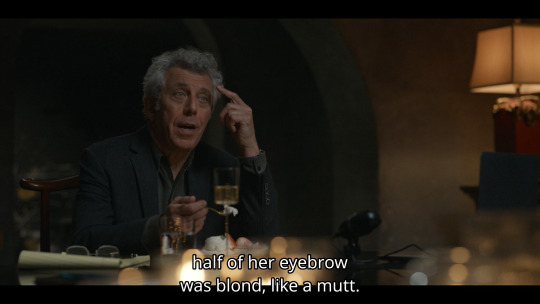
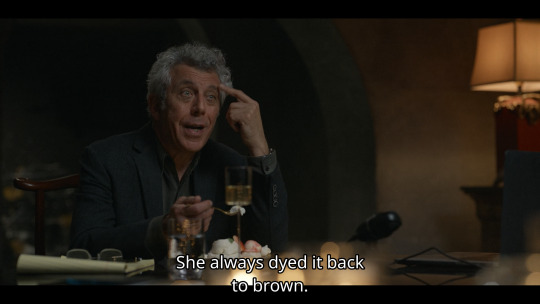
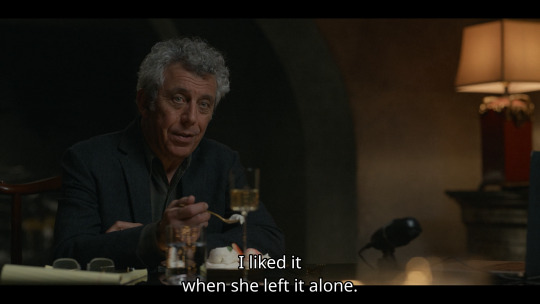
This scene - as well as how Alice in general is discussed - reminded many people of how Daniel in the books talks about Armand, such as this famous passage:

Parallels between Daniel's relationships with Alice and Armand in the books are obvious but i think they're just that, parallels. Both the sweet little scene where Daniel is talking about Alice's eyebrows and the book scene where he's talking about loving Armand not despite but because he's a monster reflect in different ways who Daniel is as a person; he feels drawn to unconventional and strange and sees beauty where others might not. He ended up in this situation with vampires too because he wanted to interview people who're rejected by the society.
If Daniel already had some sort of relationship with Armand in the past it makes sense that it would be associated with Alice in his mind. There may be an overlap between the timelines of those relationships. A memory of Armand rises when Daniel is reminded of Alice rejecting his marriage proposal, in the books Armand rejected his wish to be turn him into a vampire, which would've been something akin to marriage. I think Alice being real is much more compelling for Armand's character too, with Armand expressing surprising understanding and sympathy toward Daniel's wife rather than just speaking about his own experience through an imaginary woman.
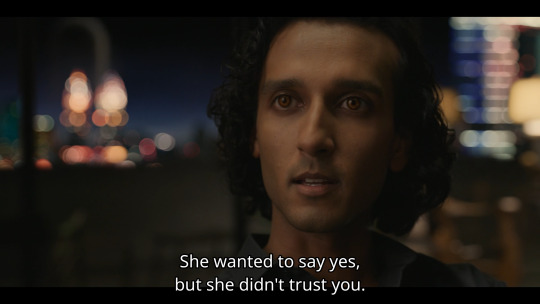
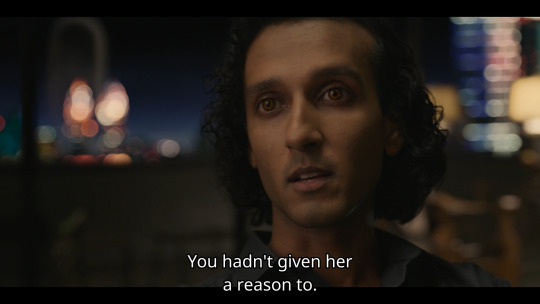
Completely putting aside Devil's Minion and is it a thing in the show or not, i think Daniel's family is particularly important to Louis' and Daniel's relationship. Something that hasn't technically been explicitly said but to me seems obvious is that Louis and Daniel strongly relate to each other as fathers. Many scenes where we see Louis and Daniel show vulnerability in front of each other have something to do with their partners and children. In 1.02 as one of the earliest examples of this Louis replicates the dessert Daniel had with Alice, trying to connect with him and his humanity through it, Daniel shares personal memory and they eat together in companionable silence.
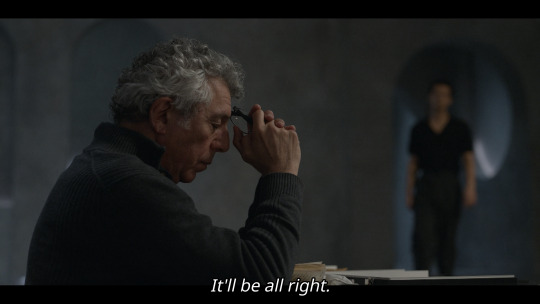
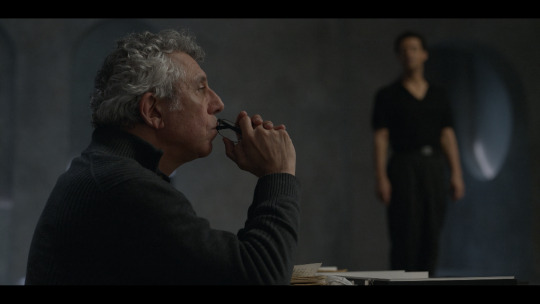
I would argue that Claudia, her memory, and Louis' relationship with her is the heart of the story in these first two seasons. Claudia entering the story in 1.04 marks the shift in the interview and Daniel's approach; he becomes both more combative and more emotionally invested. He has a strong reaction to reading Claudia's diaries, and it's not difficult for any parent to guess that he's also imagining her own daughters in similar circumstances to Claudia.
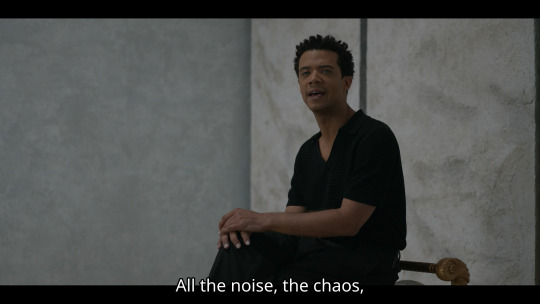
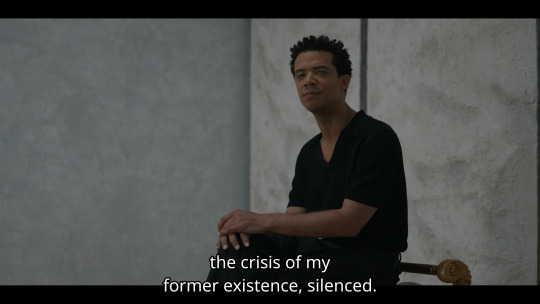
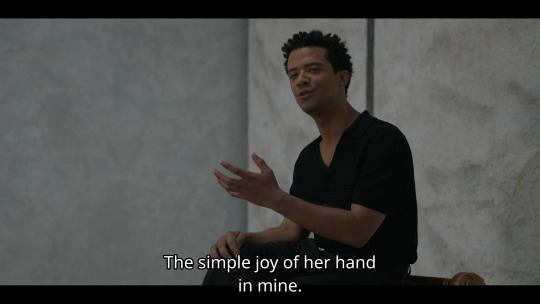
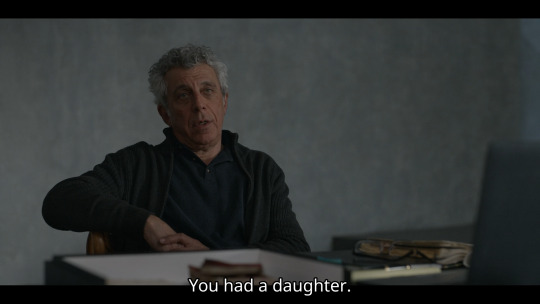
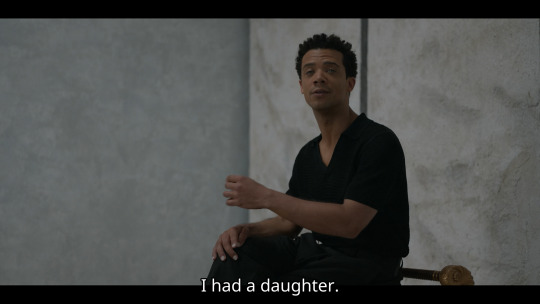
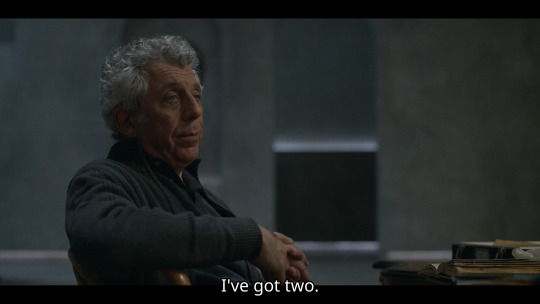
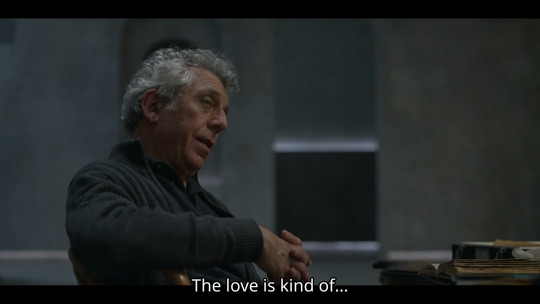
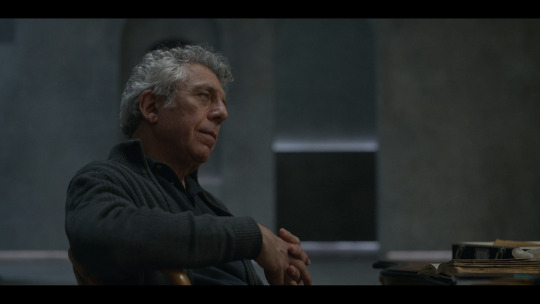
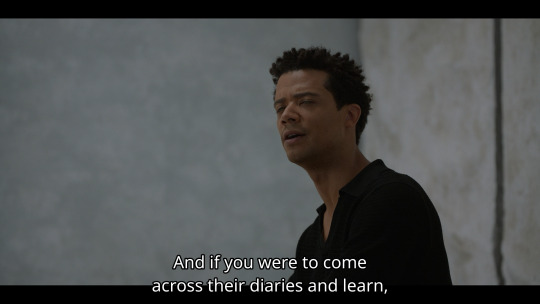
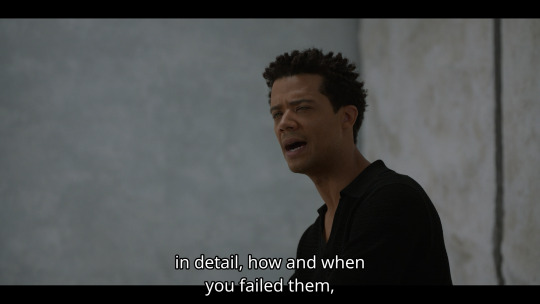
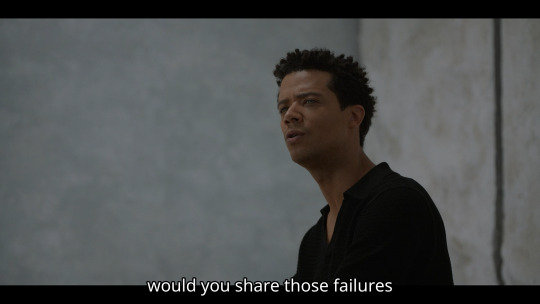
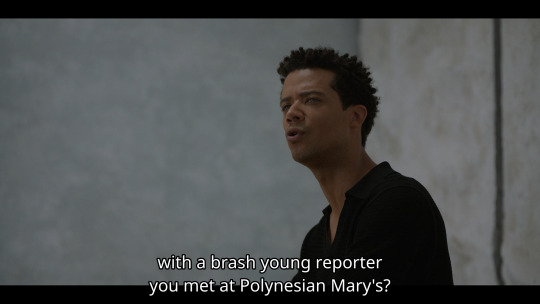
I think this conversation at the end of the episode (alongside Louis' speech to Daniel in San Francisco and them remembering it in 2.05) is the most important scene between Louis and Daniel. They share the understanding what it feels like to have children and love them so much you don't even have words for it, but still fail them. It's not a coincidence that in the original interview in San Francisco what leads to Louis attacking Daniel is Louis telling the story of Claudia leaving alone and Louis going back to Lestat, and Daniel acting dismissively and clearly not understanding why this is so painful memory to Louis. Daniel was young, stupid and high - and he didn't have children yet. Daniel now wouldn't act like that when hearing this story, and he doesn't in 1.06 when hearing it again. And notably when Louis says that he would now agree to turn Daniel, Daniel says he doesn't want it anymore and specifically mentions his daughters as one of the reasons. Having to watch your children die before you is the most horrifying thing in the world. It's something Louis had to go through and Daniel wishes he never has to, even if vampirism still intrigues him.
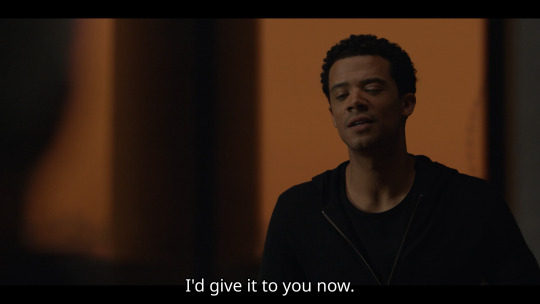
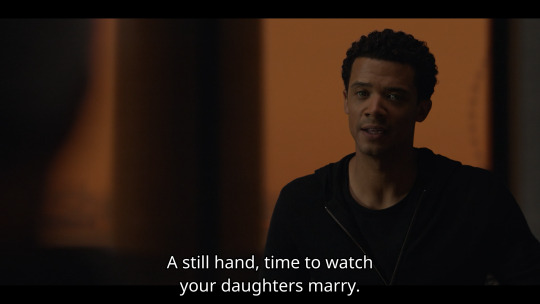
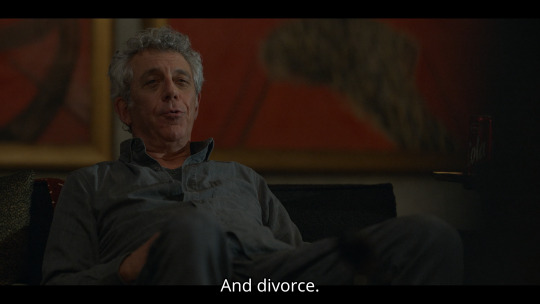
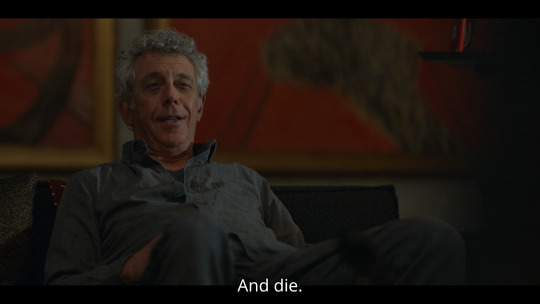
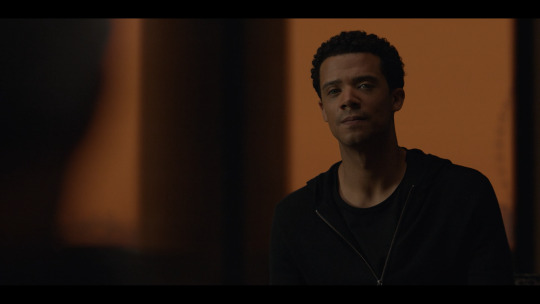
Daniel realizes quickly that it all comes down to Louis' feelings of guilt and shame about failing Claudia and his inability to protect her, because he has similar feelings about his own daughters. Louis' story unravels in s1 finale because Daniel recognizes that Louis' more palatable narrative around what happened with Claudia isn't fully true. Daniel carefully read through Claudia's diaries and tried to learn to understand her, and he positions himself as someone who's trying to defend her integrity and reveal the injustice that was done to her. This is again about Daniel's own children as much as it's about Claudia. He knows that he's a bad father, his daughters don't talk to him anymore and it's implied that he neglected them when focusing on other things that interested him more. When Daniel defends Claudia he's on some level trying to rectify his own mistakes and when he calls Louis out he's also voicing his own self-loathing.
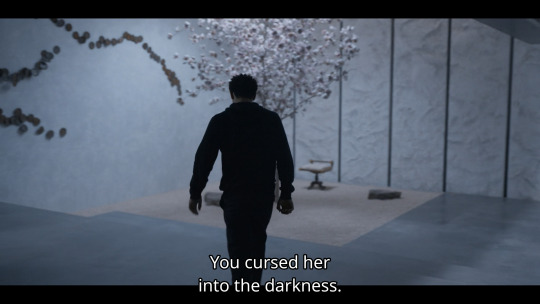
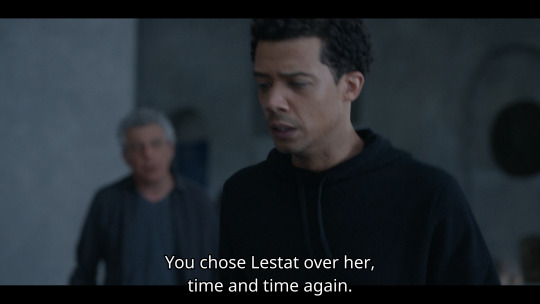
Eric Bogosian remarked that the scene in 2.01 where Louis cries and thanks for Daniel for helping him to remember that Claudia could dream is another shift in their dynamic. Daniel looks at Louis with genuine concern, and after that he tones down his usual sarcasm and jabs significantly. Daniel, again, can sympathize with how important this is for Louis. There's a new sincerity and empathy in their interactions. Sometimes the audience forgets that this story is ultimately about Claudia, but Daniel hasn't forgotten it since he first realized it. They're trying to understand together what happened to Louis' child and everything that led to it. I think if Daniel wasn't a father he would've acted differently, and Louis wouldn't have trusted him in the same way either and been able to share his and Claudia's story. I think this shared sorrow, love and guilt they feel as fathers is one of the most crucial parts of their connection.
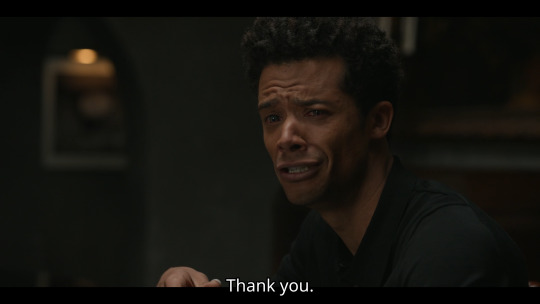
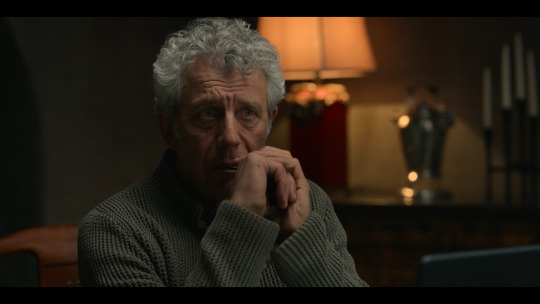
#iwtv#iwtvposting#danlou#this is mostly about daniel and louis but a bit of armand too#daniel molloy#interview with the vampire
229 notes
·
View notes
Text
ngl I always find it wild to see Star Wars stuff that's like "if you think about it in terms of realistic statistics/science then..." about almost any aspect of it.
I mean, what about the Star Wars films gives the impression that this universe abides by realistic statistics, or realistic anything else? SW is broadly a fantasy epic projected onto an IMAX screen with a space background painted on it. Yeah, the planets and moons in the films almost always have improbably limited biomes and two major locations max, because narratively these locations are usually just fantasy city-states with space aesthetics.
Starships travel at the speed of plot and we simply jump past the amount of time that presumably is passing, and sort of imply the passage of that time through shifts in the character dynamics. But this passage of time cannot be analyzed with any kind of consistency because the only logic governing it is the pace of the story.
Just how long did it take the Empire to send a full contingent of forces to Dantooine, search the entire planet, find the Rebel base, and then report back to Tarkin between one scene and another? No one says and no one appears to care. How long did it take Han and Leia to reach Bespin and what exactly went on between them while Luke was, in the same time frame, going through a protracted training over multiple days at an absolute minimum? ¯\_(ツ)_/¯
How do giant space worms survive inside asteroids that somehow have an Earth-approximate gravitational field and I guess an atmosphere? Shhhh don't think about it. The point of the sequence is not "how does the giant space worm subsist off this random asteroid and how does it breathe and how does gravity work in this context, seriously" but that the giant worm sequence is fucking sick.
There's probably some after the fact EU justification invented by people who had nothing to do with the original writing of the space worm (or perhaps there are several mutually incompatible explanations) and I am profoundly disinterested in them. Nothing could make this even slightly realistic and it was never intended to be. Star Wars sings space shanties at scientific/mathematical realism as it sails past on a completely different ship going in the exact opposite direction.
And I do mean "sails" because while astronomy might tell us that space is unfamiliar and wild on a level we as Earthbound lifeforms can barely comprehend, Star Wars understands that space is basically an ocean, yet with stars and cool but survivable planets in it, or sometimes it's air but combined with a super cool space background so you can have early 20th century aerial combat that would make no sense in actual space conditions and doesn't need to.
"If you consider relativity, then just running the Empire would be..." General relativity does not govern the galaxy far, far away. Space magic does. I'm not sure there are even time zones.
#hard to overstate the degree to which every attempt to explain#the empire keeping a tentacle monster in a trash compactor for their moon-sized roving death ray murder fortress#just seems incredibly ill-considered. drawing our attention to how weird and improbable all this stuff is does not help#and most people have no trouble accepting bizarre star wars stuff as just part of the 'wacky space fairy tale' logic#there's this really bizarre viral post about how the sw universe actually isn't a fantastic universe bc most inhabitants#would probably never possess or interact with the literal magic imbuing it—but that's missing the basic structural underpinnings#of the story#it doesn't matter how many people can use the force (in the original trilogy very few!) or believe in it or ever see it or anything#the fabric of the story and its setting are governed by fantastic rationales and elements that don't work in rationalistic terms#anghraine babbles#long post#sw fanwank#star wars#sweu critical
109 notes
·
View notes
Text

📼ᝰ๋࣭𝜗᭡ matrix theory
the matrix theory is the idea that we live in a simulation and the real world is not actually “real”. if you’ve ever seen the matrix movies it will likely make more sense. there’s a lot to this theory, but i’ll explain some of the basics:
• the idea is the world is like a computer program and we are avatars in it who have a set of rules to abide by. those who go against these rules will be punished by the matrix and those who abide will have it easier. it’s unknown who runs it. some believe it’s a higher power, and others believe it’s run by something too complicated for our brains to understand
• just like in the movie this theory implies that we’re only able to view the mainstream world until we awaken and then we’re able to see a “hidden world” that most people are too asleep to see
• most people are programmed by the matrix to NOT believe in it. that’s what the entire theory is about. few are real souls. most are npc’s (non player characters) that will never understand this world and its complexities
• some spiritualists believe that astrology and numerology are the cheat codes to this matrix and can be used as hacks to advance further in many different ways. there are also other kinds of hacks you can use but these are the main cheat codes
• this is actually a theory that’s been around for a very long time and one the aztecs believed but not in the same way people do now. they believed we were in a book
• this theory implies that there is no “coincidences” and that every move we make ends up occurring for a specific reason. however, when it comes to the actions of others hurting us without any reason that is not something we can control and the matrix will strike back at them for not abiding by the rules and send them karma
• to believe in the matrix doesn’t have to mean you don’t believe in God. some believe God runs the matrix
• certain people have it easier or harder in the matrix than others. astrology and numerology can show this. example: if you’re a 33 life path life is going to be hard for you because that’s the last reincarnation you have to go through making it like the “boss” level of the matrix
• the biggest proof of us living in a matrix is all the technological advancements in our world. if we already have vr and realistic simulations made then eventually one day we should be able to make hyper realistic ones which implies there’s a 50-50 chance we ourselves live in one that’s similar if it’s possible it can be made in our reality
• to understand our world and to free your mind you need to go outside of the matrix which is defined as the spiritual realm. the matrix will keep your mind imprisoned. most people do not understand that we are living in a world of illusion. albert einstein even believed this according to his famous quotes: “reality is merely an illusion, albeit a very persistent one.”, “the distinction between past, present and future is only a stubbornly persistent illusion”, “time is basically an illusion created by the mind to aid in our sense of temporal presence in the vast ocean of space”, etc

#matrix theory#matrix#the matrix#spirituality blog#spirituality#numerology blog#astrology blog#numerology#astrology#simulation
83 notes
·
View notes
Text
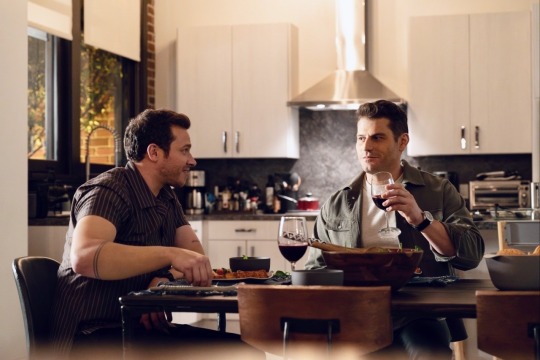
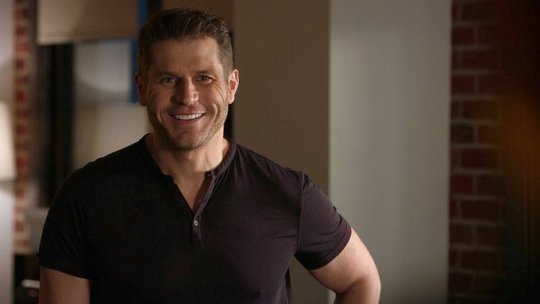
I wish fans would stop dissecting Buck/Tommy scenes but enjoy them for what they are: flirty banter between two lovers. Oliver stated in an interview he and Tim agreed to keep this relationship on the lighter side, more like a rom-com.
But no people go and dissect it like an alien discovered by NASA in a backyard.
When Tommy throws the line, "God, I hope so," he is nothing but hinting at the age difference, which is, give or take, about 7 years. So what? Seven years is nothing. Still, Tommy refers to it but means it as a joke. And Buck even blushes a little.
I can't remember we've ever seen Buck that flirty and all smiles whenever he and one of his many GFs where together. Can't the pearl clutchers be happy for him because he is finally who he is? Without having to hide a part of his sexuality that he kept buried deep inside before he met Tommy. A side he couldn't even show to Eddie. A side he knew was there but never dared to explore? Tommy came into Buck's life and opened this cage. He understands Buck on a totally different level than Eddie ever could. We see that Eddie has no gaydar. He was also clueless about Tommy being gay. Being so close to Buck, like the tin hats want them to be, he must have realized that Buck isn't only into women but guys as well. "Buddie" lived practically out of each other's pockets. And not once did Eddie ask, "Could it be that you aren't just into girls?" In a serious manner, not as a joke.
How about dissecting Eddie's dating "issues" with the doppelganger of his deceased wife? Does this imply Eddie's into necrophilia? This is ridiculous. It would be only one of their reactions. The nicer one, I guess. But it is no different from their daddy-kink nonsense.
What's wrong with these tin hats who are constantly complaining about LIs in general. No matter if it's Buck or Eddie? Shoving your favorite ship down everybody else's throat is the opposite of being open-minded and tolerant.
If Buddie should ever become canon, they will need a lot of patience. Eddie suffers from PTSD and is mentally unstable. Now, he lost his son. He has so much on his plate already. The last thing he needs right now is Buck coming over him like a force of nature and telling him he loves him. That would be the final straw if you want to see him end up in a loony bin. Eddie has to be on his own for some time to find out what and who he really wants. Something that would have to be stretched at least over a few episodes, if not over a full season. If it should be realistic. It took them 100 episodes to address Buck's bi-sexuality. And we saw hints here and there. We never saw hints of it concerning Eddie. Why do these "fans" think you can turn him bi from one moment to the other? Like Oliver said, it's not what he wanted for his character that Buck is bi, and suddenly, everyone else around him has some sort of sexual awakening. Since when can't a bisexual or gay man can't have a heterosexual bestie?
Also, bashing and harassing an actor for a part he is playing shows how sick these tin hats are. Or do they really think they could scare him off the show with their immature behavior and their unfounded hatred? Such behavior never ended a series character, let alone made a showrunner diverge from his plans and suddenly turn his show into a fan service-only show. Get a life ASAP, you tin hats and spread your toxic behavior among your ilk. It's not our fault you're leading a sad life full of envy and h*te. I am so sorry for you all. Fueled with so much anger must turn you into embittered personalities with no fun and no friends. How many of you opened sock puppet accounts to have at least someone to talk to? Living in an echo chamber can be exhausting at times...

#bucktommy#buddie tin hats#tin hats#fandom wars#evan buckley#tommy kinard#eddie diaz#ryan guzman#oliver stark#911 abc#kinley#kinkley#tevan
70 notes
·
View notes
Text
Tobecky is one of those ships where it's like, at first glance, you ask why people even see it as a viable pairing. It's not like Becky and Tobey are exactly shown getting along often, it's not the healthiest ship out there, as a matter of fact there are... certain episodes that make the pairing downright toxic (Looking at you Go Gadget Go).
Yet at the same time, I think that's what I like about the ship. In real life, relationships are never a straight path, they require effort from both sides and nine times out of ten there will be road blocks, times when partners do objectively questionable things, that's just how relationships are, and in a weird roundabout way, I feel like Tobecky is a good example of that. Sure Becky and Tobey fight a lot, they disagree about a lot of things and do things that upset each other, but they also understand one another on a fundamental level.
Seriously the parallels between these two is actually sort of surreal. They've both been lumped into this box of being one thing, said thing being expected of them. Becky is expected to do hero work as WordGirl, and Tobey, while nothing is forcing him to be evil, episodes like "Tobey Goes Good" show that when it comes to his mentality, doing bad things is the only way to get people's attention, to make people care about him.
They're both child prodigies who, in a lot of ways, are locked out of a lot of the things that other kids have. Both have families who could never really understand them. Becky for obvious reasons, and Tobey because, as made pretty clear through episodes the center around him, his mother doesn't tolerate his behavior and as far as we can tell, has never tried to understand why he does what he does, instead giving him corporeal punishment via ear pulling (which by the way, she does that to him even when he, to her knowledge, hasn't misbehaved, kinda fucked up if you ask me, coming from someone who had parents who used physical punishment as a way to reprimand their kids).
Another thing to point out when it comes to these two, is that they are both pretty arrogant, Tobey more apparently so than Becky, but Becky clearly takes pride in being WordGirl, and even beyond that there are times where she views her own opinions as above others, whether she realizes it or not. Obviously Tobey is called out on it more, but there are clear signs that Becky's status as a superhero has lead her to gaining a bit of an ego.
Really though, the big thing that I think draws people to this pairing is the rare moments where they aren't fighting, and are instead sitting down, talking, and it's when that happens that the two of them are actually able to get along, that they're able to understand each other, because in a lot of ways, they are the same, just on two different sides of the moral spectrum. I think this is best shown in "The Robot Problem" where the two of them are shown to legitimately be able to work together, Becky even saying that they make a good team.
So to summarize, the thing that makes Tobecky good, at least for me, is not that it's the safest ship, or that it doesn't have moments of toxicity, but rather in how it feels more realistic, more complex than your average pairing, the fact that when it comes down to it, Tobey and Becky understand each other, loathe as they are to admit it.
Alright, that's all. Thank you for coming to my TED Talk.
51 notes
·
View notes
Text
Let's talk about the relationship between "personal level redemption (i.e. one character starts making changes for the better)" and "the corrupt institution/context in which the characters are developed to hurt each other".
Now, one or two characters reaching the point where they say "that's it, no more, I don't want this, this is not right, I am choosing not to continue on this path" is great, don't get me wrong. Redemption (AKA the path towards trying to do better, to make reparations, to not repeat the mistakes of before - forgiveness is not an obligation here, only that the character has recognised their hurtful actions and has ceased them and is now trying to do better) on a personal level is so important, and should not be diminished in value.
However, it is also simply and factually true that when it comes to the context in which certain characters have made those terrible choices or been forced to become something they otherwise might never have become, that in order for there to be actual long term solutions, those corrupt systems, those violent institutions - those must be dismantled. These things must stop in order for the system to not just keep on chugging, to not just break the next set of characters as it broke the last ones.
Sometimes, a character cannot realistically meaningfully travel very far down their path to redemption before something changes or shifts within that system in order to allow them that. For example, a character who is constantly on the defensive because people are hunting them down to try to kill them doesn't have the option of not defending themselves (usually with violence) unless they choose to die at their hunters' hands. Even if they do not start fights, they can't disengage if others start them first; in order to stop, others must also stop.
It is unfair, in contexts where there is a great and systematic corruption, to place the onus of a "happy ending" on singular people if there is no intention of dismantling the system that gave birth to such horrors. How cruel, how unjust, to take one person and say to them, "this is all, totally and completely, your fault, and it is your responsibility to change because you are the thing that needs fixing here."
Think of it like climate change: yeah, sure, putting your rubbish into the correct bins and reducing your personal carbon footprint etc is helpful. But what change you can make, if you make it alone, if you make it isolated, will never meaningfully chip away at the global level of pollution caused by the whole system. What needs to happen is a lot of people banding together to force the system to change, and for those who benefit from it to be held accountable. Because that's the other element of tragedy: there is nearly always someone benefitting from the tragedy, and it is not often those who are the most blamed or slandered.
Yourself may be a good place to start, but it is not where it ends. It is a long hard road, to the recognition that there are many factors that contribute towards tragedy - to the personal choices of characters, and to the reasons they made those choices in the first place; the action = reaction, the consequences, the pressures, the emotional and mental factors, the physical factors, the numerous interweaving stories of everyone trying to protect them and theirs, and sometimes in doing so hurting others.
Redemption and understanding how tragedy came to be is rarely as simple as we want it to be, and this complexity is a feature, not a bug. If you want to be able to point at someone and say "there; that is the bad thing" then 99/100 times I would first take a good look around to see what made the bad thing bad. Then I would take one good look at yourself in the mirror, and ask yourself if you could have been the bad thing, too, if things had shaken out just that little bit differently - the answer might not be one that comforts you.
#airrec talks#this is 100% about BOTH c!dream AND c!tommy btw#it takes two to fucking tango and both of them are victims of a greater culture of violence that hung them both out to dry#this is also why the amnesia ending happened tbh. it all just had to get wiped clean and on a meta level#resetting the world and everyone's memories was a shortcut way to doing that. also the ccs were so burnt out by the end lbr
51 notes
·
View notes
Text
the bear s3 spoilers
below the cut! thinking about claire and stuff we saw this season re: carmy/syd/the restaurant/donna, just finished the season so itll be a mess and also im comin in way too hot on this so my bad
sometimes...... sometimes i believe you guys are all watching different tv. im not sure how this season didnt feel like a direct through line from s2?? and im not sure WHY everyone is SO MAD about claire LITERALLY "haunting" this season. girl. come on. we need to have a sit down talk about how the berzatto generational trauma is the real meat of this show (this will make sense, just trust me). thats the MAIN EMOTIONAL POINT. syd's relationship with her dad, marcus and his mom, richie and evie, even tina and louie are all examples of parental relationships that are tender, sweet, supportive, etc. these are INTENTIONAL!! by creating these relationships we see PLAINLY how fucked donna is and how much she fucked up all of these kids. thats why "ice chips" was such a FANTASTIC episode. there was SO MUCH unpacked, so much revealed, so much worked through with sugar and her but at the end of the day she's still learning how to unlearn all of this horrific narcissistic bullshit. SHES STILL UNLEARNING THOUGH. thats where fucking DONNA of all people sits right now——somehow, she's learning how to heal. EVERYONE IS LEARNING. that's also what is so important about that episode.
now lets look at carmy. in "ice chips" we are LITERALLY told about how each berzatto is born: mikey fighting against the idea of being alive at all, nat into a quiet, soothing room, and CARMY is fucking born into EVERYONE SCREAMING and ARGUING and FIGHTING. we are BLATANTLY told that all carmy has ever known is HELL and all he's ever known how to communicate is through exploding. this is so violently against what we also know about his personality from childhood in "fishes" (anxious growing up, arts-oriented, had a hard time making friends). now, he works a violently stressful job, processing the trauma from both his mother (and chef fields [joel mchale], realistically) through the high-stress environment.
NOW. ENTER CLAIRE.
HOW is she not fascinating to you all. we don't see her whole story (because the bear, duh) but we are given just enough pieces here to put together that her story runs parallel to carmy's. how are you not getting this. walk with me.
claire. glasses, nerdy, quiet, sweet, girl next door. family friend! cute, but considered mid for a long time by everyone at school, but suddenly the berzatto men all badger carm, "oh she got a glow up, oh shes looking for you, she wants to see you," etc etc etc. what happened in between?
she finds herself. she finds the stressful thing she LOVES, which is the hospital. her job is objectively more stressful than carmy's (illustrated by that scene earlier in the season but i forgot the episode, where claire talks about the girl who got her shit wrecked by the glass table), and while we don't have an exact understanding of what her home life was like, we understand that her and carmy both have a level of internal anxiety that thrives on the stress of their careers. HOWEVER, claire does it because she loves it. carmy just doesn't know how to stop.
this is what makes claire feel like "peace" to carmy——because her high-stress job is a choice, an active choice she is making because it fulfills her. it's not to prove her dead brother wrong, or to honor his own legacy, or to prove that dickbag boss wrong, or to leave a mark on the world, or to make her own life worthwhile, or to prove that she doesn't need anyone else. she genuinely enjoys helping people even when the days are stressful, or scary. he's obsessed with this. he wants to know how she does this. every day she leaves that stress at home——and he wants to learn how to do that too.
claire is VITAL to this season and to understanding carmy's stress——and how far back he is in his healing process. it should only become more and more apparent, as we see characters like tina (the beef/the bear became vital to her success/development as a chef AND person, both for the people AND her love of food), marcus (not hiding his grief, but using it to help rationalize how much his mother loved him and wanted to be surrounded by people that love him), and richie (finding a purpose through service/expo and understanding he can start over again) push through their own traumas and struggles to become better people. if donna can be not only present at sugar's bedside during labor, but WELCOMED at this point in the show, it makes carmy's inability to heal all the more present. claire is an important part of this puzzle: she helps us see a window into a world where carmy is balanced emotionally, but unbalanced professionally, because he has no idea how to make the two coexist.
however, the idea that he can be balanced emotionally at all is so fucking enticing——with the help of someone who experiences stress in the same way as him (and who is familiar with his familial trauma), he has the opportunity to grow up and move on from his family trauma and wounds perpetuated by the industry he works in.
on the flip side of this....... his inability to process any of this is starting to impact syd. and frankly, that's some bullshit. his lack of communication, inability to community build/trust ANYONE, and his violent stubbornness is pushing her into the same space that he was in under chef fields, in a much slower, more subtle manner, and for slightly different reasons. her panic attack at the end of the season could read in two directions to me: her stress over the responsibility of changing so many people's lives has boiled over once she remembered that the beef once was truly great (hey five star review on the fridge!), OR, she realizes how much she isn't in it for the food. fuck a Michelin star: she wants to cook with her family. chef terry says at the end of "forever", in the garage with carmy, that she's so grateful she got to do whatever she wanted, whenever she wanted, where she wanted, with the people she wanted to do it with. sydney is so close to having those things at the bear——but carmy's dysfunction is keeping it just out of arms reach. the two of them are now on opposite sides of the approach from last season: syd dying for a star, and carmy dying to cook for the woman he loved. now, carmy is hungy for recognition again, desperate to prove something, and sydney is remembering (thanks to the conversation with other chefs during the ever funeral service) why she loved cooking in the first place. so this leaves us to wonder: should she stick it out? for the people? or make something of herself? is she carmy, or is she terry? i guess we will just have to see.
all this to say: every character is connected. the bear is a show about family, found and blood, and the choices we make for, with, and because of the people we love, for better or for worse. food is only the center of it, because it's the center of all of our lives. you can't hate claire without understanding where she sits in the web of the berzatto family. and really, you can't hate her if you understand what her presence means for carmy, for syd, and the restaurant as a whole.
#the bear#the bear season 3#the bear fx#the bear hulu#the bear meta#carmy berzatto#sydney adamu#claire the bear#the bear s3#the bear spoilers#the bear s3 spoilers#the bear season 3 spoilers#the bear season 3 meta#the bear analysis#eenposting#sorry.... feeling very passionately about this show#im not sure why this season felt like a stretch from the past two seasons#i didnt feel that way at all.... felt like a natural progression of the thing weve been given. some of them are healing and some of them ar#NOT. some of them very much are not. but all we can do is watch#thats always been the beauty of the bear. all we can fucking do is watch. and theyre all just gonna duke it out cus the family is CRAZY#i need some other friends to finish this shit so i can do real textual analysis because i ahve a lot of feelings about the metaphors and#imagery and symbolism and stuff from this season. this seaon was really really good to me and it felt like one huge movie#SO cinematic and SO good and visually so gorgeous and it sucks that theyre moving in a more cinematic direction and ppl hate it#LAME! LAME BITCH#THIS IS SOOO THE EXACT SAME SHOW AS ITS ALWAYS BEEN. THEY FINALLY JUST HAVE MONEY#i do wish we got more kitchen stuff but i understand we are growing out of the kitchen stuff as carmy gets more and more uncomfortable#in the industry#AND LIKE I SAID#THE KITCHEN AND FOOD WAS ALWAYS JUST THE FUCKING STAGE FOR THIS ABSOLUTELY BATSHIT FAMILY MELODRAMA#LIKE WHAT????? YOU ALL KNEW THAT RIGHT....... THIS SHOW ISNT REALLY ABOUT A KITCHEN OR FOOD OR CULINARY ARTS AT ALL
33 notes
·
View notes
Text
(Very long post, sorry.)
I had an experience with a college professor last semester that really got me thinking about academics and ableism, specifically in college writing.
A few months ago, my class was having an open discussion, and I brought up an opinion that had been on my mind for a while.
I basically said, "There's a gap between college-level writing and the average person's reading level that we need to fill. Nobody should need to look up words every three seconds to understand a study that could affect their life, so we either need more people to rewrite these studies for the general public to understand, or these studies, in general, should be published with language that isn't so complicated."
My professor responded by saying something like, "Sure, that's a good goal. However, wouldn't a better goal be to raise the average person's reading level so that everyone can understand college-level writing?"
I (in my frantic and confused way) tried to bring up the fact that there are people born at a disadvantage in life. In fact, getting everyone to a perfect college reading level isn't a realistic goal. It certainly isn't for me, and I don't want it to have to be for other people. In fact, the professor who told me this also struggled to understand the chapters we were assigned to read in that class.
Really, it all comes down to this: college-level language is inaccessible.
Even more importantly, many people will never be able to understand most of the huge words thrown around in college writing.
At school, I am constantly told my writing style is "simple" and "easy to understand." This is something my classmates have told me isn't "bad" but just "different." However, I'm still insecure whenever someone mentions it because it is always pointed out. I use a smaller vocabulary, they seem to say, but don't worry. It's just a preferred writing style, they reassure me. They think the simple language is a choice I could stop at any time.
Well, what if it isn't just a "style"? What if I struggle to expand my vocabulary? Learning one new word takes me ages because I need to see it in all kinds of contexts. Even then, oftentimes "context clues" are no help, and I completely misinterpret the meaning of a word for years because it seems like every other native English speaker knew what it meant without needing to say it. A lot of the time I'll read the definition of a new word and instantly forget it after finishing the sentence it was in.
So yeah, I'll say it with pride: Simple words are powerful. Simple words are beautiful. And most importantly, simple words are not inferior in any way to words like "quintessential" or "expedient." (I have no idea what either of those words mean even though I've looked them up plenty of times and used them accurately in essays before.)
Simplicity is why I like shows meant for all ages better than shows meant only for adults. Because in shows that are written with children in mind, there aren't confusing messages you have to spend energy untangling. There aren't unnecessary analogies or feelings that are "implied" but never said. The characters' facial expressions and emotions are easy to read and the moments where I am confused are rare.
Now, this is all coming from an autistic person with low support needs. My reading comprehension score is considered slightly above average, and so is my problem-solving abilities which means I am lucky and I can understand a lot of what I read in college. The main point of this little "essay" was to point out a common conversation I despise hearing in college, the one about simple language and its implied inferiority.
Because guess what? Language is not accessible to everybody. Many of us, even those with high reading comprehension, struggle.
Our goal should never be to make everyone capable of reading college-level books and studies. That is asking for those who need accommodations to accommodate themselves, something I'm sure other disabled people are tired of having to do. Instead, the goal should be making college language more accessible, making knowledge accessible. After all, the reader is only a fragment of the conversation. The writer is the majority of it.
TLDR; Everyone deserves access to language and knowledge that makes sense, and bigger words never mean they are better.
#actually autistic#ableism#autism pride#autism awareness#actuallyautistic#autism#asd#learning disability#accessibility#disability#college#academics#university#student#autistic spectrum#autistic#autism spectrum disorder#autism spectrum#tw ableism
301 notes
·
View notes
Note
Any tips on how to create a proper schedule? I struggle a lot with time management.
Mastering Time Management: How to Create a Schedule That Works for You
Time management can be a tricky thing to master, but the good news is that with a little planning and a few smart strategies, you can create a schedule that keeps you on track and reduces your stress levels. If you’ve been struggling to get a handle on your time, don’t worry—you’re definitely not alone. Here’s how to create a proper schedule that works for you.
1. Start by Setting Clear Goals
Before you even think about scheduling, take a moment to define what you’re trying to achieve. Whether it’s finishing an assignment, studying for exams, or balancing school with extracurricular activities, knowing your goals will help you prioritize your time. Break these goals down into smaller, actionable tasks that you can tackle day by day.
2. Understand Your Natural Rhythm
Everyone has different times of day when they’re most productive. Some people are morning people, while others hit their stride later in the day. Pay attention to when you feel most alert and focused, and try to schedule your most challenging tasks during those times. Use less productive times for easier or routine tasks.
3. Use a Planner or Digital Calendar
Having a physical planner or using a digital calendar (like Google Calendar) is essential for keeping track of your time. Start by blocking out your fixed commitments like classes, work, or meetings. Then, fill in study sessions, homework time, and any other tasks. Don’t forget to include breaks and time for relaxation—these are crucial for avoiding burnout.
4. Prioritize Your Tasks
Not all tasks are created equal. Use the Eisenhower Matrix to categorize your tasks into four groups:
Urgent and Important: Do these first.
Important but Not Urgent: Schedule these.
Urgent but Not Important: Delegate if possible.
Not Urgent and Not Important: These can be minimized or eliminated.
By prioritizing your tasks this way, you ensure that you’re focusing on what really matters.
5. Break Tasks into Manageable Chunks
Large tasks can be overwhelming, leading to procrastination. Break them down into smaller, manageable pieces that you can tackle bit by bit. For example, instead of blocking out an entire day to “study biology,” break it down into specific chapters or topics to study in shorter sessions. This makes the task less daunting and helps maintain focus.
6. Set Realistic Time Blocks
When scheduling your tasks, be realistic about how long each one will take. It’s better to overestimate and have extra time left over than to underestimate and feel rushed. Start by tracking how long it actually takes you to complete different tasks, then use this data to plan your schedule more accurately.
7. Use the Pomodoro Technique
If you struggle with staying focused, try the Pomodoro Technique. This method involves working for 25 minutes, then taking a 5-minute break. After four cycles, take a longer break (15-30 minutes). This technique helps maintain focus and prevents burnout, especially during long study sessions.
8. Review and Adjust Your Schedule Regularly
Your schedule isn’t set in stone. Life happens, and things change, so it’s important to review and adjust your schedule regularly. At the end of each day or week, take a few minutes to assess what worked and what didn’t. If you find that certain tasks took longer than expected or that your priorities have shifted, make adjustments accordingly.
9. Build in Flexibility
While it’s important to stick to your schedule as much as possible, it’s also crucial to build in some flexibility. Allow for buffer time between tasks in case something takes longer than planned or if something unexpected comes up. Flexibility prevents you from feeling overwhelmed when things don’t go exactly as planned.
10. Stay Consistent, But Be Kind to Yourself
Consistency is key when it comes to following a schedule, but it’s also important to be kind to yourself. If you have an off day or something doesn’t go as planned, don’t beat yourself up. Simply adjust your schedule and keep moving forward. Remember, the goal is progress, not perfection.
11. Use Apps and Tools to Help
There are plenty of apps and tools designed to help with time management. Apps like Todoist, Trello, or Notion can help you organize your tasks and keep track of deadlines. Experiment with a few and find what works best for you.
12. Balance Work and Rest
Finally, remember that a good schedule isn’t just about getting work done—it’s also about ensuring you have time to rest and recharge. Make sure to schedule in downtime, hobbies, and social activities. A balanced schedule will keep you motivated and prevent burnout.
By implementing these tips, you’ll be well on your way to mastering time management and creating a schedule that supports your goals. It might take some trial and error to find what works best for you, but with persistence and a bit of flexibility, you’ll get there. Good luck, and happy scheduling!
Love,
Sophia
#studygram#motivation to study#study notes#study tips#books and libraries#study motivation#studying#studyblr#quotes#studyspo
22 notes
·
View notes
Note
Hello! Do you have any tips for writing 'geopolitical' relationships between kingdoms in a story?
In The Forgotten Legends of Chima, there are tribes of anthropomorphic animals (separated by species) who have their own lifestyle and culture. There are certain tribes with more privilege than others (e.g. some are more rich than others, some withhold more Chi than others), which of course will cause some kind of resentment from others. Not only that, but the actions the leaders/kings take also affect their relationship with other tribes. The people suffer from all of this too; if a king, for example, dislikes a certain tribe, his people will also dislike it too.
I'm trying to write these kinds of relationships as realistically as possible, because TFLOC's story is almost entirely based on the coexistence of Chima's tribes. How do you, or any other writer, tackle this in their stories? Any tips? Thanks :)
How to Write Geopolitical Relationships Between Kingdoms in Any Fictional Story

Thank you so much for this submission, I'll try my best to give you a professional, and detailed explanation so you don't have to do as much research as I did (lol).
Introduction
Geopolitical relationships are the intricate connections and dynamics that exist between kingdoms in a fictional world. These relationships play a crucial role in shaping the political, social, and economic landscape of your story. By understanding and effectively portraying these relationships, you can add depth and intrigue to your narrative. I'll try my best to provide you information and help you explore the elements of geopolitical relationships and provide tips on how to write realistic and engaging connections between kingdoms in your fictional story.
What are Geopolitical Relationships?
Geopolitical relationships refer to the intricate connections and interactions between different kingdoms in your fictional world. It encompasses various aspects such as geography, history, culture, and economics. These relationships determine how kingdoms interact, cooperate, or clash with each other, shaping the overall political and social landscape of your story.
Why are They Important in Fictional Stories?
Geopolitical relationships are important in fictional stories for several reasons. Firstly, they add a layer of realism and authenticity to your narrative, making the world you've created feel more immersive. By understanding the geopolitical dynamics, readers can engage with the story on a deeper level.
Moreover, these relationships serve as a catalyst for conflict and suspense. They provide opportunities for power struggles, alliances, betrayals, and dramatic plot twists. When done effectively, geopolitical relationships can captivate readers and keep them hooked throughout the story.
How to Write Realistic Geopolitical Relationships
(Now, the good part.)
To write realistic geopolitical relationships in your fictional story, you need to consider several key elements. These elements include geography, history, culture, and economics. Let me help you explore each of them in detail:
Geography
Geography plays a crucial role in shaping geopolitical relationships. Consider the physical location of the kingdoms, including their natural resources and borders. A kingdom located near valuable resources may have an advantage in trade negotiations or military capabilities. By understanding the geographical factors, you can develop realistic relationships between kingdoms.
History
The past interactions between kingdoms significantly influence their present relationships. Historical events such as wars, trade agreements, and alliances shape the attitudes, trust, and animosity between kingdoms. Take into account the history of your fictional world and the impact it has on the geopolitical landscape.
Culture
The different cultures of the kingdoms are an essential aspect of geopolitical relationships. Explore their distinct values, beliefs, customs, and social structures. These cultural differences can create tensions, misunderstandings, and alliances between kingdoms. By delving into the cultural aspects, you can enhance the authenticity and complexity of your geopolitical relationships.
Economics
Economic systems and trade relations are crucial factors in geopolitical relationships. Consider the economic capabilities of each kingdom and how they influence their interactions. Trade agreements, rivalries, and military capabilities are all elements that can be influenced by the economic dynamics between kingdoms. By incorporating these aspects, you can create more realistic and engaging geopolitical relationships.
How to Write Realistic Geopolitical Relationships
Now that we have explored the key elements of geopolitical relationships, let's discuss some practical tips on how to write them effectively:
Do your research: To create believable geopolitical relationships, take inspiration from real-world history and geography. Understanding how real nations interacted can provide valuable insights for crafting realistic relationships between your fictional kingdoms.
Be consistent: Once you have established the geopolitical relationships between your kingdoms, strive for consistency throughout your story. Ensure that the actions and decisions of the kingdoms align with their established relationships. This consistency will make the narrative more coherent and enhance the credibility of your world.
Use conflict: Geopolitical conflict can be a fantastic source of drama and suspense in your story. Introduce clashes of interests, political intrigue, and power struggles between kingdoms. Utilize the tensions and rivalries to create compelling conflict that drives the plot forward.
Don't be afraid to change things: If you find that the initial geopolitical relationships need adjustments to serve your story's plot, feel free to modify them. As long as the changes are well-justified within the context of your story, altering the relationships can add unexpected twists and keep readers engaged.
Conclusion
Geopolitical relationships are a vital component of fictional storytelling. By understanding and portraying these relationships realistically, you can enrich your narrative and captivate readers. Remember to consider the elements of geography, history, culture, and economics when crafting these relationships. By conducting proper research, maintaining consistency, utilizing conflict, and being flexible with adjustments, you can create engaging geopolitical relationships that truly bring your fictional world to life.
(That was a handful of words lol)
Additional Tips I Use for Writing Geopolitical Relationships in Fictional Stories:
Think about the motivations of the different kingdoms. What are their goals? What are their fears?
Consider the role of individual characters within the geopolitical landscape. How do they influence or interact with the different kingdoms?
Use the geopolitical relationships to create conflict and suspense in your story.
Don't hesitate to change the geopolitical relationships as your story progresses. Flexibility can lead to more exciting plot developments.
Copyright © 2023 by Ren T.
TheWriteAdviceForWriters 2023
#creative writing#on writing#writing#writers block#how to write#thewriteadviceforwriters#writeblr#writing tips#writers and poets#royalcore#royalty#geopolitics#worldbuilding#fantasy fiction#novel tips#novelist#novel writing#new novels#original novel#fiction#short story#short stories#romance novels#politics#fantasy worldbuilding#fantasy writing#urban fantasy#character creation#world creation
211 notes
·
View notes
Note
Hello!
I recently came across a post that triggered me a bit, and I wanted to talk about it.
In essence, the points raised were that:
Women are more inclined to ship Sasuke and Naruto because they have chemistry and share a lot in common.
Shipping Sasuke with Sakura makes no sense because they are too different, and she doesn't understand him.
If BoruSara were to happen, it would imply that their fathers are a thing because of the parallels.
Sakura is a poorly written character, and people can't relate to her because she's too unrealistic.
Sakura is poorly written because, essentially, she's different from Sasuke and Naruto.
First of all... SNS exists not because of the supposed chemistry between them but because they are two attractive white guys sharing a lot of screen time together and so, the perfect combo for fujoshi shipping. Justifying this expedition is like justifying the fact that the frequent depiction of partially naked women on car racing posters has no relation to the intended audience.
If Sakura shouldn't be with Sasuke because she doesn't understand him, does Naruto understand him? Seriously?
Naruto understands Sasuke's loneliness, that's it.
Nothing more, nothing less.
I'm not bashing their connection, but let's be honest, nobody really understood Sasuke there -yet it didn't stop them from wanting to help him-
Furthermore, what does this imply? That you can only be in a relationship with someone who has a similar background?
Saying Sakura doesn't understand Sasuke at all is superficial on so many levels that I won't even bother dwelling on it.
Next, the idea that people think the parallels they cling to justify their ship is just... bizarre.
If BoruSara were to happen, it wouldn't prove anything about SNS because the biggest difference between these two ships would be the author's intention.
SNS would have happened if Kishimoto wanted their relationship that way, but that wasn't the case. It has been repeatedly emphasized in the manga that their relationship is not romantic.
If some interpret it that way, that's fine, but they shouldn't tell the author how he wrote HIS own manga. And no, it's not heteronormativity. I don't even understand why some fanon ships seek canon validation for their shipping.
Not to mention that every time they talk about these parallels, many seem to deliberately forget that these two children are not mirror images of their fathers but their own individuals.
Yes, they have the foundation of their personalities, but that's just it, the foundation. Apart from that, they differ on so many levels that it's not even funny.
Sarada also shares a lot of her mother's personality, and it's as clear as day. So, if I follow this logic, does BoruSara also imply that NaruSaku could have been a thing despite Sakura's total absence of romantic feelings?
Boruto can indeed be like his father, but he also tries to be like his mentor, so sometimes, he resembles him too. And he can be as calm and focused as his mother, not to mention he has personality traits unique to him. All this makes him someone too different from the "Naruto carbon copy" label stuck on him. Saying that is really downplaying his character.
Moreover, the relationship these two have is also different from that of their fathers: it's normal and not built on a heap of negative feelings and deadly fights that led to a vitriolic friendship.
As for the last two points, Sakura is less unrealistic than Sasuke and Naruto, yet not many bat an eye at that. Maybe because it's a shounen manga about ninjas, and unreality is actually expected...?
In fact, Sakura is the most realistic character in this series.
Regarding the identification question, just because you can't identify with her doesn't mean everyone can't. I do, and many others do too because, for once, in the whole history of shounen, we have a female character with authentic and not-so-likable flaws, approaching more the human being without the need for a traumatic event or a horrible childhood to justify her behavior.
Her character development is incredible, not just because "she was weak at the beginning and became strong," it's more than that.
Sakura has shown me that no matter how you start, you can reach the destination you want if you work for it. Her transformation is phenomenal: throughout the manga, she radicalizes in ALL aspects. She removes her blinders, starts seeing people for who they really are, becomes more understanding and attentive, learns —and sometimes in the most brutal ways— that everything is not black and white and that you sometimes have to make horrible choices to protect others.
She changes in so many ways, and the best part is that Kishimoto didn't make her some perfect Mary Sue. He made her evolve despite her flaws, for which I will always be grateful.
Sakura is not a poorly written character. Yes, she could have been more explored, and sometimes her author did her wrong, but that doesn't make her a bad character. She could have been better —all the characters in this series could have been— but that doesn't mean she's "worse."
She is fundamentally the reason why I'm in my last year of college today and intend to persevere in my studies (and it's not even a joke).
I never had a family model I could identify with, and all the characters (fictional or not) I love or admire have always seemed out of reach, just an ideal to idolize but unable to imitate.
With Sakura, however, it has always been different; every time I look at her, I think, "if she could do it, then why not me?"
Her importance in my life in terms of motivation and emotional development has been crucial, so it's really frustrating to see people deduce that just because they can't identify with her, no one can, and she's a bad character.
She's not poorly written; she's just different.
Kishimoto once said that his goal with Sakura was to create a realistic female character that little girls could identify with and despite all the controversy surrounding her character, he actually succeeded in this challenge.
Many of us, little girls that we were, saw ourselves in OG Sakura (whether we admit it or not) because the way she was written is how a lot of pre-adolescent girls behave (minus the rapid character development).
It was nice to grow up with her because it showed me that I didn't need to be perfect or have incredible motivations or be "cool" from the start to become someone exceptional. She taught me that my future is not set in stone. And most importantly, she taught me to be myself, to be authentic, to accept and love myself as the imperfect human that I am.
The weirdest thing about this is that these statements came from someone who claims not to care about SNS and doesn't hate Sakura. How can a person claiming to be neutral come to such a conclusion? Honestly, it baffles me; this kind of pseudo-analysis is on the same level of nonsense as what antis spew.
If some can't be bothered to understand a character, then they should simply say nothing about her.
I'm sorry for bothering you with this, but after reading this thing, I just couldn't let it pass.
I don't know how you guys manage to tolerate this fandom, let alone respond to all the strange and stupid takes you receive day after day. In any case, you have my utmost respect.
Thank you for listening, and I wish you a beautiful and happy new year.
First of all... SNS exists not because of the supposed chemistry between them but because they are two attractive white guys sharing a lot of screen time together and so, the perfect combo for fujoshi shipping. Justifying this expedition is like justifying the fact that the frequent depiction of partially naked women on car racing posters has no relation to the intended audience.
I agree apart from two things.
Naruto and Sasuke do have chemistry, but there's just nothing romantic about it.
I wouldn't bring the colour of their skin into it, that opens up a whole other can of worms.
If Sakura shouldn't be with Sasuke because she doesn't understand him, does Naruto understand him? Seriously?
Naruto understands Sasuke's loneliness, that's it.
Nothing more, nothing less.
Naruto understood Sasuke in some ways (loneliness, being high level shinobi who could read each other's thoughts through fighting etc), and Sakura understood him in other ways (his likes/dislikes, how his mind works and his decision making processes etc).
Furthermore, what does this imply? That you can only be in a relationship with someone who has a similar background?
Yep, that's one of the things that's always irked me the most from their points. It's like they think that just because Sakura couldn't empathise with Sasuke's tough upbringing, that makes her an unsuitable partner for him, which is just all kinds of stupid. It's also one of the reasons the SK fans prefer that ship, since Karin also had a relatively tough upbringing, she'd be able to "understand" Sasuke better than Sakura. As if being able to empathise with a tough childhood is all there is to understand about a person.
If BoruSara were to happen, it wouldn't prove anything about SNS because the biggest difference between these two ships would be the author's intention.
SNS would have happened if Kishimoto wanted their relationship that way, but that wasn't the case. It has been repeatedly emphasized in the manga that their relationship is not romantic.
Agreed. This silly idea that BS's canonisation would somehow serve as proof that SNS should have happened, is one of the 4 main reasons why I do not want BS to happen. Although it is the least important to me out of the 4 of them.
If some interpret it that way, that's fine, but they shouldn't tell the author how he wrote HIS own manga. And no, it's not heteronormativity. I don't even understand why some fanon ships seek canon validation for their shipping.
Not all interpretations and opinions are valid. I'm sorry but I'm sick of people hiding behind this false idea that just because they say it's their opinion or interpretation, it's just as valid as everyone else's. No, opinions and interpretations can be wrong. Authorial intent dictates how the narrative is supposed to be perceived and understood. Therefore, if Kishi says that something is a certain way, then that's the way it is, end of story, no room for further interpretation. If Kishi says that Naruto and Sasuke are platonic, and that they were never meant to be anything more than that, then that's the way it is. Other interpretations are wrong, because Kishi's word is gospel.
Not to mention that every time they talk about these parallels, many seem to deliberately forget that these two children are not mirror images of their fathers but their own individuals.
That too.
Sarada also shares a lot of her mother's personality, and it's as clear as day. So, if I follow this logic, does BoruSara also imply that NaruSaku could have been a thing despite Sakura's total absence of romantic feelings?
Agreed, I'd say that in terms of personality, Sarada is a closer parallel to Sakura than Sasuke, and NS obviously didn't happen.
Boruto can indeed be like his father, but he also tries to be like his mentor, so sometimes, he resembles him too. And he can be as calm and focused as his mother, not to mention he has personality traits unique to him. All this makes him someone too different from the "Naruto carbon copy" label stuck on him. Saying that is really downplaying his character.
💯
As for the last two points, Sakura is less unrealistic than Sasuke and Naruto, yet not many bat an eye at that. Maybe because it's a shounen manga about ninjas, and unreality is actually expected...?
In fact, Sakura is the most realistic character in this series.
To be honest, I have no idea what they could be referring to when those people label Sakura as apparently being unrealistic.
Regarding the identification question, just because you can't identify with her doesn't mean everyone can't. I do, and many others do too because, for once, in the whole history of shounen, we have a female character with authentic and not-so-likable flaws, approaching more the human being without the need for a traumatic event or a horrible childhood to justify her behavior.
Her character development is incredible, not just because "she was weak at the beginning and became strong," it's more than that.
Sakura has shown me that no matter how you start, you can reach the destination you want if you work for it. Her transformation is phenomenal: throughout the manga, she radicalizes in ALL aspects. She removes her blinders, starts seeing people for who they really are, becomes more understanding and attentive, learns —and sometimes in the most brutal ways— that everything is not black and white and that you sometimes have to make horrible choices to protect others.
Unfortunately, many people just don't see any of that. They see an annoying, selfish person who treated Naruto poorly (despite that only being applicable to before the Forest of Death), "obsessed" over Sasuke (when she really didn't, and that criticism is far more applicable to Naruto anyway), broke off her friendship with Ino over a boy (showing how they missed the entire point of that fight), and was essentially useless (despite among other things, saving many important people's lives, multiple times).
Sakura is not a poorly written character. Yes, she could have been more explored, and sometimes her author did her wrong, but that doesn't make her a bad character. She could have been better —all the characters in this series could have been— but that doesn't mean she's "worse."
"She could have been better —all the characters in this series could have been" - Yes, I'm glad you highlighted this. This is by no means a Sakura exclusive criticism. It's just more of a problem for her since she was a main character.
She is fundamentally the reason why I'm in my last year of college today and intend to persevere in my studies (and it's not even a joke).
I never had a family model I could identify with, and all the characters (fictional or not) I love or admire have always seemed out of reach, just an ideal to idolize but unable to imitate.
With Sakura, however, it has always been different; every time I look at her, I think, "if she could do it, then why not me?"
Yeah I get that, I said something very similar about her during this post towards the end, where I described the primary two ways in which I found Sakura to be an inspiring character.
Kishimoto once said that his goal with Sakura was to create a realistic female character that little girls could identify with and despite all the controversy surrounding her character, he actually succeeded in this challenge.
Many of us, little girls that we were, saw ourselves in OG Sakura (whether we admit it or not) because the way she was written is how a lot of pre-adolescent girls behave (minus the rapid character development).
I'll take your word for it. Personally, towards the beginning I did indeed find Sakura very irritating, for several different reasons, but I grew to appreciate her for what she brings, rather than continuously judging her for how she was at the very beginning. But apparently, "character development" is either a foreign concept to these people, or can only be applied if the character in question moves on from her initial feelings. Because if not, then her entire character automatically "regresses", regardless of the reasons why she retained her feelings.
The weirdest thing about this is that these statements came from someone who claims not to care about SNS and doesn't hate Sakura. How can a person claiming to be neutral come to such a conclusion? Honestly, it baffles me; this kind of pseudo-analysis is on the same level of nonsense as what antis spew.
That reminds me of a video that Swagkage made on YouTube, which I talked about in great depth during this post, regarding how he tried to lie and say that he didn't hate Sakura and that he was impartial to her, yet the vast majority of the video was him hating on Sakura.
I don't know how you guys manage to tolerate this fandom, let alone respond to all the strange and stupid takes you receive day after day. In any case, you have my utmost respect.
Thank you for listening, and I wish you a beautiful and happy new year
My general tolerance for people's bullshit is honestly inhuman, lol. But many thanks, and happy (belated) new year to you as well ^_^
61 notes
·
View notes
Note
I saw a post a while ago lambasting Amphibia for having its characters 'do the most horrendous shit imaginable' for the sake of comedic plots and get off far too easily for it. In their view, Amphibia took slapstick comedy way 'too far' sometimes. I thought this was quite hyperbolic; the protagonists made serious mistakes, but rarely anything I'd call unforgivable, especially since they'd almost always show a level of remorse. But it did make me think about the way immoral acts are portrayed in comedic shows, and how we, as viewers, can tolerate and forgive things we probably wouldn't in real life because of the way these acts are presented to us.
I mean, think about Hop-Pop using mind control on Anne, Sprig and Polly in Children of the Spore. If anything like that happened to you in real life, chances are you wouldn't react to someone violating your body and mind by shrugging your shoulders and going 'well, guess we pushed you pretty far.' You'd probably beat the shit out of HP and never talk to him again. But that episode is kinda self-aware about the awfulness of it all (which I love). Polly flat-out says the old frog crossed all kinds of ethical and moral lines XD
Going back to the whole 'too far' accusation, though, I'm pretty sure we're smart enough to understand the difference between a silly frog show and real-life crimes. I don't think there needs to be super realistic consequences to everything (as the post I mentioned was suggesting) when your focus is on writing a slice-of-life fantastical comedy. I guess the only real argument you could make is 'but it's teaching kids to forgive absolutely atrocious, unforgivable things!' And...maybe? But I'm pretty sure any kid with their head screwed on straight understands not to replicate or forgive immoral behaviour too easily.
I guess what I'm trying to ask is, do you think characters doing awful things for the sake of comedy or plot can go too far, in that they can unintentionally make characters far too heinous to sympathize with, or do you think complaints like those of the post I mentioned above are a result of taking something far too seriously? Is there even such a thing as 'too far' when it comes to slapstick comedy?
So let's talk about intent, tone and framing because these things REALLY matter to a story. It's actually part of the problem with fandoms wanting everything to be realistic, darker, etc. because they're really asking for one thing: For them to all be the same. To not be what they are because, you know, the fact that these are comedy cartoons for kids MATTERS.
But first let's actually shift gears AWAY from cartoons for a second to talk about things being genuinely irredeemable for comedy. MANY people are really against prank style reality tv because it preys so completely on human suffering. Because these people are doing terrible things to just normal people. I personally don't like the premise... But I like Impractical Jokers. That show frames it DEMONSTRABLY more about terrible things happening to these four friends, by these four friends, and usually the worst they do to others is leave them a little confused or a bit uncomfortable. One of the big elements to changing this is that all the challenges are effectively dares. Someone either commits to the bit or if it becomes too much, they dip out but they are ALLOWED to dip out, minus the final jokes which are always pretty much purely at the Joker's expense.
Are these four people bad people? No. But part of why we also know that is because it's television and they're doing it to entertain as part of being comedians. Bizarrely enough, a lot of modern cartoon fandoms seem to want to act like fiction IS reality. It's where you get people going "Oh, you're being so cruel to a 14 year old, nuerodivergent girl!" and me going "I'm being critical of a character in a narrative. Can you please stop telling me, an actual human being in the real world, to kill myself because of a fictional character?"
Because shock of all shocks, PEOPLE CAN TELL REALITY FROM FICTION! In fact, even kids can! The fucking video game industry had to go through this hell HARD to prove that killing people in a video game is not the same as having psychopathic tendencies in the real world. Do you know how many kids play CoD? And those kids are fine. At least most of them.
So with all of that preamble out of the way: When can a morality focused show fuck up?
It's actually incredibly rarely in the terrible things the characters do because the show USUALLY addresses these elements as part of the moral of the day.
For the example given of Hop Pop's mind control, it is shown as... Eerie to put it mildly. Even from go, Hop Pop only enjoys it so long as he doesn't have to interact with it. It is never framed as a positive besides a bit selfishness. However, Hop Pop is a good enough person to show genuine remorse and try to fix this. He puts in a lot of effort, is admonished as the lesson of the day is learned to not try to control people and to potentially compromise and then it MOVES. ON. Because they live in a fantasy world where anyone could die at any second. A day of none thoughts is not actually that big of a deal, especially since it wasn't done out of malice or even really on purpose. It's a part of the fun of the setting and of the fantasy genre as a whole that you can just do these weird concepts like this and move on because magic happens sometimes. You might grumble for a day or two but hey, at least it was your neighbor and not the king, am I right!? Hail King Andrias.
A big part of this though, and why so many morality driven shows can have characters do terrible things without imparting the wrong lessons, is because it's addressed. Pretty much explicitly. It is framed as wrong, addressed as wrong and then fixed because it was WRONG. Even if it gives momentary gain, that gain is almost always also included in being wrong.
It's actually a formula that Amphibia purposefully breaks for an episode, carrying it over from directly the one before, because there genuinely was one crime committed that hadn't been addressed and by the time it was, that sin had grown to a point where it was too reasonable to have a character still be mad to ignore it: The music box. Hop Pop hiding it is actually an AWFUL thing to do because it dooms Anne, it means her parents will never get closure, dooms the rest of Anne's friends, etc. etc. Hop Pop has to be okay with Anne never quite being fully happy because of always wanting to go home while also living with this false hope that he implanted into her. A trust he has not earned because of the lie.
So even after they theoretically have their morality episode about the box, Amphibia takes this time for such a PERSONAL attack on Anne to stick with her for another episode during The First Temple. It actually acknowledges that you don't get over everything immediately. That sometimes you need space. I don't even like that episode but the break in formula is actually meant to make the message more powerful, and does so successfully, especially because the crime was different. It wasn't of indifference or something quickly fixed. It was of long term AGONY and a complete breach in trust that would make one question what relationship they can have with another person. There's pretty much zero other crimes in the show like that besides Sasha/Marcy's betrayals, which aren't treated as easy fixes, and Andrias' betrayal is the heel turn that makes him the primary antagonist. These crimes, these personal, genuinely awful things to do to other people that could be replicated, unlike so much of the fantasy violence, are usually seen as something you do have to work on. It's a great, nuanced take on being a morality one off show while also being able to elevate some issues to being dealt with more seriously and consistently.
Also, quick note from someone on my Discord: They NEED to do bad things in order to teach! They are meant to be the bad example so when their actions lead to things going wrong, you understand not to copy that behavior. This is honestly storytelling 101 for most... Plots. Not just morals but plots. If the characters do NOTHING, nothing happens and nothing will be learned.
You want a show that will teach kids bad lessons and then reinforce there are no consequences for those? WELCOME TO THE OWL HOUSE! Specifically: The show that tells you to lie and keep secrets because your fear justifies keeping them!
I know that sounds shitty but like... Luz is the main character. For half of the show, she is portrayed as the second most moral character in the show behind Willow. She admonishes stealing, cheating, etc. as her contrast with Eda. Then after Yesterday's Lie... She literally can't stop lying and never faces consequences for it.
The closest actually comes in Falls and Follies where Amity at least forces a promise out of Luz to be more open with her. This actually though doesn't fix the problem, it just makes it WAY WORSE because one of the main targets of these lies, that kids can easily replicate, especially because Luz is almost always lying about things that might upset others which is the most common thing kids will lie about, is Amity. So now we have both lying and breaking promises. You know, two of the most basic morals any kids show should impart on the audience!
In Reaching Out though, Amity gets a little mad but then it's excused because of her dad! In Thanks to Them, no one gives a shit that Luz has been keeping secrets and lying for months. Camila makes sure Luz DOESN'T tell her friends the truth either about her plans. You know, Luz's MOM who should want her daughter to be an honest person. The show then constantly keeps cutting Luz off from telling anyone anything because it literally can't without revealing how bullshit what she's doing is until by the end of the show... Luz hasn't been punished in any way and the lies just... Drift away.
Completely unaddressed.
This causes a problem because while the lies theoretically hurt Luz... They hurt less than losing her friends. Hurt less than disappointing a parent. Hurt less than making her look bad. And this is the main character. The one kids are supposed to connect with the most. The one who usually most explicitly defines the morality of a show. And she is never punished or stopped from all. Of. Her. Lies.
(As a note: This is also how you get a lot of guys taking the wrong lessons from anime perverts. Sure, this guy gets smacked but he never loses his friends. Never faces real consequences. In return... He gets way more ass than the main character does, doesn't he? *gags violently*)
THAT is how you impart bad morals. It's not surprising to me that the fandom for TOH hides behind excuses so much for their show because their literal main character was justified, in fiction, to have all of the terrible things she did, all the choices she didn't have to make or the people she discarded, because she ALWAYS had an excuse. And so long as you have an excuse, by what TOH says, you can get away with fucking anything.
And mind you, that last part is NOT Luz specific. Have a bad uncle? Don't worry Hunter, the fact that you literally hunt, oppress and potentially kill wild witches can be entirely forgotten and ignored. Have a mean mommy? Don't worry Amity, we literally never have to properly address the literal years of bullying you did to another character or even how attempting to kill Luz was wrong. Collector? COME ON! You just had bad friends/family so now you just need good ones and we can forget all about you oppressing people for fucking months!
This isn't addressing these problems. These are excuses. And excuses can seem REALLY appealing to people. After all, how many hide awful acts or statements behind: "Come on, it was just a joke." Shields are useful for trying to avoid criticism after all. If you never acknowledge you were in the wrong, you don't have to feel bad for having done something mean, let alone terrible.
Just to bring it back to Amphibia: Sasha tries to do this. She believes she knows best so she feels justified in all she does because it will make everyone the happiest, at least in her own eyes. Then in Turning Point, she realizes the folly of her ways, addresses that she was a terrible person and plants her foot down FIRM. No more acting the part of protector while actually being a tyrant. She will risk her very life in order to right these wrongs. And we see it also in Commander Anne where she is taking the change seriously. These are two half episodes, a single episode in full, that lets us know that her actions were inexcusable and that they were wrong and now she is allowed to be a part of the good guys now that she has made sure the audience knows that they can look to her as an example.
One full episode to ADDRESS the fact that what Sasha did was wrong and to not excuse it but to learn from it.
That's why all these terrible things protagonists do in shows is fine. They learn from it. They genuinely regret their actions. They show the audience why they shouldn't have done it. It's never okay to the show that they did. Not that it can't be forgiven, because people should be allowed the chance to grow, but that it still wasn't okay.
For a kid's show, that is pitch perfect. It's why moral of the day storytelling exists and I can't really think of any huge errors in this department on Amphibia's side. It's pretty damn good at smacking someone over the head when they act like a jackass. At bare minimum, there are WAY worse examples out there.
======+++++======
This is absolutely one of those criticisms that has me look at the person making it and go "Just admit you don't like cartoons. Or children's media in general probably." Admittedly, there's actually plenty of adult stuff just as childish, no one stays mad in Family Guy, so it's probably just "You don't like cartoons." It's the sort of bad faith criticism that just reveals you as not having actually wanted the product but whatever you thought the product should be.
I have a public Discord for any and all who want to join!
I also have an Amazon page for all of my original works in various forms of character focused romances from cute, teenage romance to erotica series of my past.
I have an Ao3 for my fanfiction projects as well if that catches your fancy instead.
If you want to hang out with me, I stream from time to time and love to chat with chat.
A Twitter you can follow too
And a Kofi if you like what I do and want to help out with the fact that disability doesn’t pay much.
55 notes
·
View notes
Text
Gojō between whom and others there was always a wall emotionally between, so when he loved someone he didn't know how to express it. Gojō who would copy trivial things about those he loved so that he feels closer to them. Like when he asked for the top part of his uniform to be exactly like Getō's, and when he used to drink CocaCola when alone but would switch to Getō's choice when they were together.
He was always so different from others that usually he couldn't relate to them in the slightest, so by feeling like he has something common with them, he felt like they are closer to him. It's strange because when one feels lonely they feel like they are the ones that need to get closer to people. In jjk236 Gojō's tells Getō that he tried to make his students understand him but they couldn't. To make others understand him was the only realistic solution, and the closest a student of his has gotten to it was Yuta; I wonder if he had time to realize this about Yuta before he died. Getō was the only person he felt like he had to catch up to. Despite being much stronger than him, once upon a time they were the strongest together. Even when he surpassed him by a lot, the bond he felt they had based on it remained the same to him. But they were on a whole different level now regardless, things could never be the same. And this is why when Getō left he felt like he was the one being left behind, and not that he was letting behind Getō.
#呪術廻戦#jujutsu kaisen#jjk#gojo satoru#geto suguru#hidden inventory arc#jjk 236#kfc breakup#I can't believe that the last one is actually an already existing tag 😭
23 notes
·
View notes
Note
I’ve just completed your most recent chapter and what a delight it was from start to finish. The slow burn continues to be delicious, and you’re doing an amazing job of gradually adding bits of kindling to the flames to keep DHr’s relationship progressing (and to feed us readers). This most recent chapter was a textbook definition of fic that gets me giggling and kicking my feet.
I’m always amused by our sweet Victorian child Draco’s reaction to sex, and the reference again to sheets and friction sent me. I’m pretty sure this isn’t the first time Draco has been nearly undone by his bedding, and it got me thinking about Pureblood culture’s views of sex and intimacy.
I know oftentimes in fanon, we tend to get Slytherin sex god/goddesses who are having their first sexual experiences pretty early, though occasionally we get a more prudish/Puritanical Draco. We know in Lionheart’s universe, Narcissa alludes to a certain level of hanky panky with Lucius in the RoR, and it certainly seems like Draco had imagined any number of acts with Hermione, even if he hasn’t acted on them in public or perhaps even privately.
If it’s not spoilery, I’d love to know more about how Pureblood culture in Lionheart generally views sex/intimacy, especially inside/outside of courtship and marriage.
It's a mixed bag! I think the Slytherin sex gods thing is a kind of wish-fulfillment (loving compliment) because, put bluntly, the number of 15-17 year-olds who are even kind of charitably good at sex is a mathematical rounding error. Also, Hogwarts has group dorms. Sexiling one person in college is hard enough; imagine you have to sexile (i.e., declare publicly your intent to fuck) 3-5 people every time you want to mess around. I'm not saying it doesn't happen, it absolutely does — it's a coed boarding school, you can't fight the wind — but I will say it's probably more at the realistic level of high schoolers fumbling through the excruciating ordeal of learning intimacy, and not "the plot of Euphoria is happening in the dungeons at all times."
Anyway. I interpret the wealthier pureblood set as a kind of wizarding aristocracy, so while in general they're expected to perform to certain expectations and social mores when they're in social/public settings, the fact of the matter is it's the twentieth century and sexual mores are changing a LOT from decade to decade. Narcissa's upbringing would have been radically different from Draco's in terms of how much sex and intimacy would have been open subject — in no small part because Narcissa's generation kind of blew the ceiling off that particular conversation. She was born in 1955 and lived through the Sexual Revolution, meaning that her childhood, adolesence, and young adulthood took place in practically three different geological eras of social life. Meanwhile, women like Walburga and Druella were members of the Greatest Generation (maybe Silent Gen on the younger side), and would've been incredibly traditionalist.
Of course, no matter what the social rules are, teenagers will find a way around them. For the purposes of Lionheart, in 1995, it's understood by most pureblood parents that kids are gonna do what kids are gonna do, but there are specific standards about who you can be seen with and make certain kinds of promises to. Narcissa kind of references this at the end of book 3; she goes on this insulting little spiel about how generations of Blacks and Malfoys had secret muggle-born pets that they kept on the side, they just didn't bring them to dinner parties. Basically, what you do in the privacy of your bedroom is your own business; just don't get caught and don't try to push boundaries, and your social set will be understanding, up to a point. But it would be absolutely improper for "dating" or "courting" to take place between a muggle-born and a pureblood, because that expresses the intent to associate with them in Society, which is a discrete sphere with its own set of rules — one of which is that you have to enforce the caste system.
With respect to specific mores and rules, there's a few references to "etiquette." That stuff's inspired by real etiquette manuals from Victorian and Edwardian England, though I've occasionally thrown in my own twist when it suits me. Dance with the one that brought you; you should have an escort to balls, theoretically but not necessarily someone you're interested in; women run the household, men run the estate. There are certain standards of chivalry and respect on the men's part, but there are also standards of ladylike conduct and decorum on the girls'. Daphne is shocked when Katie wears a suit to the Ball— to the point where she's like "?? ARE you a girl?" — because the rules of dress and poise have been so drilled into her. The level of slut-shaming we get from the Slytherin girls (despite several Slytherin girls being sexually active) also indicates how female sexuality is policed in a way male sexuality isn't; the rumors about Draco and Daphne hurt Daphne, not Draco. This double-edged hypocrisy runs hand in hand with the idea that women are training to be wives, and shouldn't be sleeping with people (if anyone) who they're not seriously pursuing for marriage. Relatedly, courting/engaged couples are usually seen together, a la Crabbe and Millicent, because the idea is you're supposed to be preparing for your marriage; now that you're socially connected, you've begun your tenure as a Unit, and you're expected to act like it. It would be strange for Vince or Millie to go to a ball with someone else unless that partner was a relative or (possibly) a close family friend. It would... imply something.
Marriage between a man and woman would be expected, not because purebloods on the whole are traditionalist — which, to be clear, they are — but because the emphasis on bloodlines means children are a priority. Pansy gives us the best précis on this in Book 2. Blaise, being gay, is in an interesting place vis-a-vis the marriage question because his position doesn't come from being heir to an old estate, it's from his mother's money; in that respect, he's not bound by usual expectations of hereditary legacies, which is possibly why he's comfortable being out. (Although there's a blink-and-you-miss-it remark about some tension with his mom in "Miseducation.")
#in retrospect that moment with daphne is so funny to me#tfw your social rules are so intense you spontaneously invent the idea of being nonbinary to explain why Girl But Not Skirt??#and find that (to your understanding) completely novel concept more plausible than a girl just wanting to put a suit on#anyway. this is just incoherent rambling about sex and marriage and stuff#I hope it's half interesting!#lionheart spoilers
29 notes
·
View notes
Note
Do you think that George and John would have fixed their relationship had John lived past 1980? Because I don't.
I'm probably the wrong person to ask about this because in general I'm not a fan of speculating about what a person would or wouldn't have done had they lived. One of my favorite pieces of advice I ever got was when I was tutoring disadvantaged students during college (the best job I've ever had) and my supervisor told me potential is unknowable by definition. Meaning it's just as misguided and counterproductive to say someone has a lot of potential as to say they have no potential, because that's just not how that word works. Partly because people are dynamic and changeable but also because there are recesses of our character that no one, including ourselves, can be aware of.
So I truly don't know what would have happened between them, and I don't think you know either if I'm being totally honest. But, to throw all that out the window and speculate anyways, I think the most realistic answer is: Possibly.
I think it's fair to say that John and George were both highly mutable individuals, and that of the four beatles they spent the most time and energy trying to understand the self and achieve some kind of self awareness and personal growth (even if those attempts were sometimes misguided -- I'm looking at you, primal therapy). And I think in this case their mutability is both a complicating factor and an indication that reconciliation really was a true possibility for them.
John was making enormous strides in his mental and emotional health at the time of his death, and it's entirely possible that might have led him to feel differently about George over time, or to simply decide he didn't want to put energy towards being angry at him anymore. (Not to equate letting go of anger with being adapted/self-aware – just that that’s one way growth can manifest, it’s definitely not the only one or the best one.)
For his part, George was very vocal both musically and irl about all the ways he felt he needed to change/grow, though of course whether he ever got there is a difficult question to answer. His views on forgiveness are really interesting here (and sometimes a little magnanimous, tbh) but one thing that initially surprised me is that Paul credits George with convincing him to forgive Yoko.
(Which I guess just surprised me because I always believed the conventional wisdom that Paul is the sweetie and George is the cranky guy, but obviously that's a very limited snapshot of both of them.)
Anyways, to me the fact that George was putting time and energy towards learning to love Yoko implies that he may have been hoping or wanting to relearn his love for John as well (if he hadn't already.)
So I do think it’s possible that at some point in the last 40 years they’d both have been in a mental space to want to interact positively with one another again. It's not something that was guaranteed to happen, and I don't think we can even fairly say it was probable or improbable because that implies a level of knowledge of their souls that no one has or has ever had, but it's not outside the realm of possibility.
On a related note, another thing I've found kind of profound in analyzing the beatles (or anyone) is the line “The wounds of childhood do not heal” (Maryse Condé, Crossing the Mangrove.) Which is to say that the pain we experience as children shapes us so profoundly that every experience we have as adults is seen through the lens of that pain, and we reenact our childhood and our childhood family systems again and again without healing.
Now, in the case of the beatles, I think it’s a little blurry what constitutes childhood and what constitutes a family system (“family” system being a misnomer because every close collection of people has the tendency to form a system). Because they found each other as adolescents, and went through a life changing and arguably traumatic experience at a very young age that no one else could ever understand, the system they formed shaped them very powerfully and the wounds it instilled probably never healed, either.
I guess that's my way of saying that the four of them had kind of an extended adolescence, and they continued to reenact the system they built as adolescents in order to survive the insanity they were living in well into adulthood.
Since George was something akin to a forgotten child in this system, and Paul was something akin to a golden child, (both of which are miserable, horrible ways to live, btw – this trend of using golden child to mean “spoiled” is the dumbest fucking thing I’ve ever seen and also incredibly destructive to people who have actually experienced that trauma) those two really did have a tendency to be at odds with one another throughout their entire adult lives.
(Obligatory reminder that this is wild speculation and I'm not their therapist, or indeed any kind of therapist at all.)
But I think it’s that (and the fact that we tend to analyze anyone who touched Paul’s life purely through the lens of Paul) which tends to make people think George was fundamentally opposed to forgiving people who’d hurt him or allowing systems to adapt over time, even if that assumption doesn't really bear out in any of his other relationships. And, obviously, it's a little tricky to try to transplant the Paul/George relationship onto the John/George relationship and equate or even compare the two, because John played a very different role in the system and was a very different person from Paul.
Also, the fact that the wounds of childhood do not heal absolutely does not imply that we'll always be a slave to them. Crossing the Mangrove is an amazing book about decolonization and intergenerational trauma but one of its most powerful themes was the idea that we can continue to build ourselves and build our world in the shadow of enormous pain. And we'll always be informed by that pain, but being informed isn't the same as being defined.
All this is just to say it's very hard to anticipate what kind of changes John and George would have undergone in the last 20-40 years and whether those changes would have brought them closer together (or, if not closer together, would have encouraged a sense of acceptance towards one another.)
I also think there’s a conversation to be had about whether rebuilding that friendship would have actually been for the best for their mental and emotional wellbeing (a LOT of children from toxic family systems ultimately come to find that sorting through the pain isn’t worth it for the chance of reconciliation and that’s okay), but this is already way too long lol.
Anyways, thanks for the ask and sorry this turned into such a novel!
#I think this is in response to my saying it's okay for paul to hold onto anger#and I guess I'd say it's also okay for john and george to hold onto anger#and it's okay for you too#that's a natural part of life and not a moral failure#paul mccartney#george harrison#john lennon#the beatles#beatles#ask#anon
23 notes
·
View notes